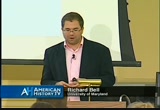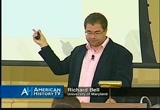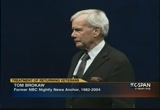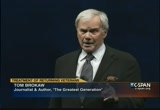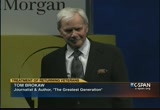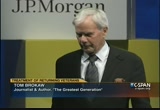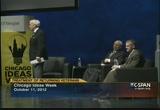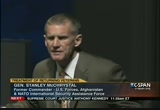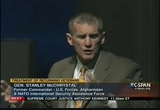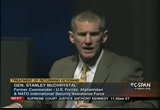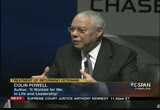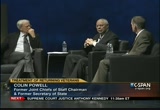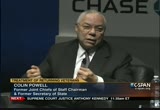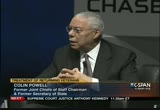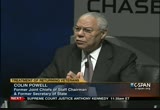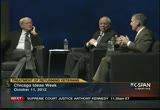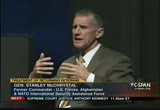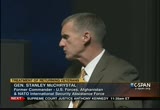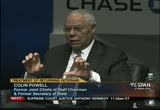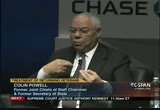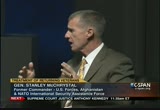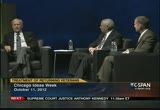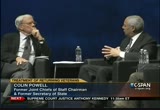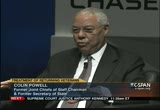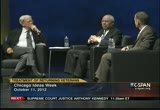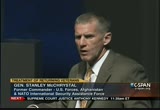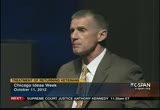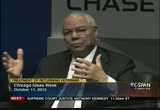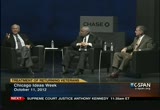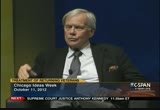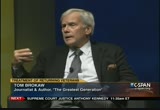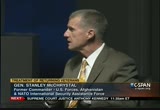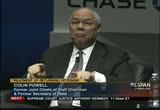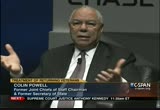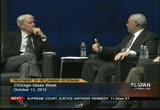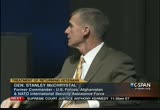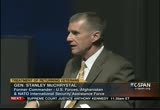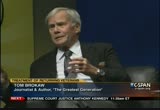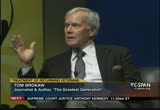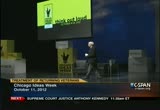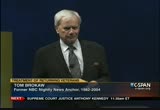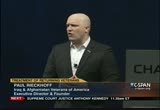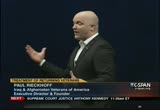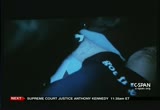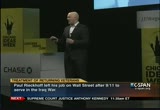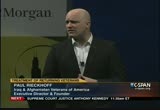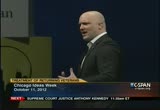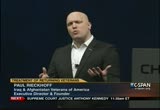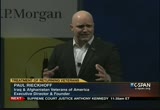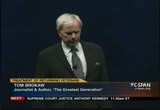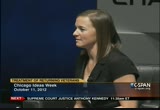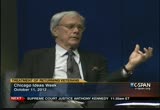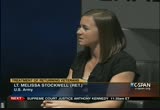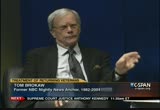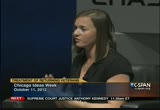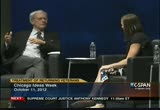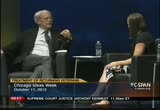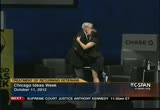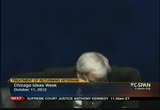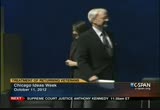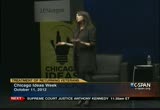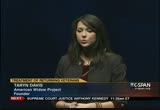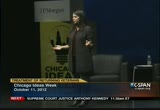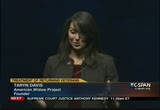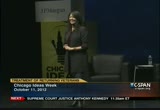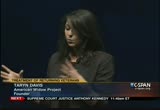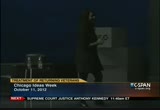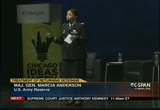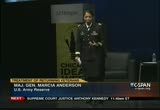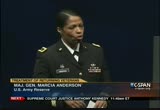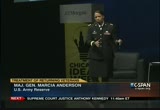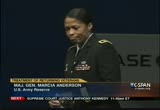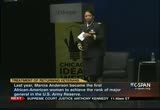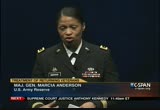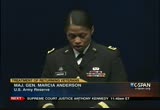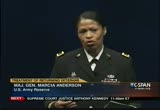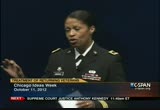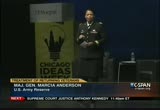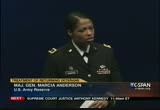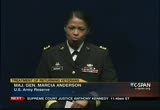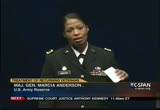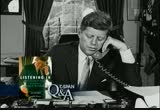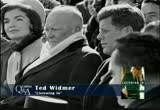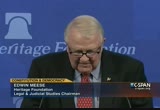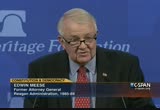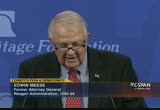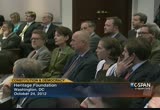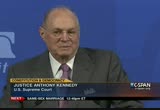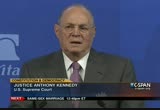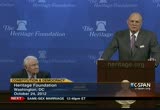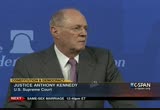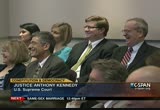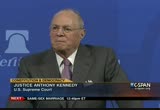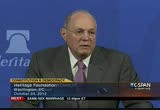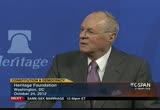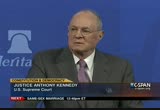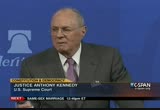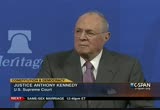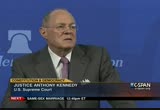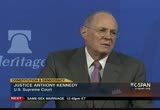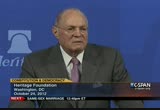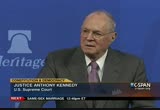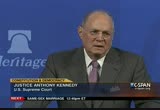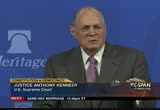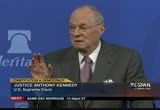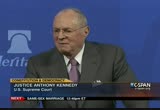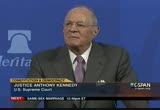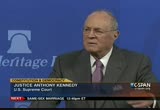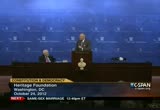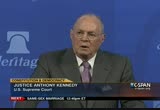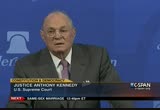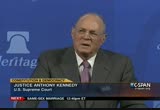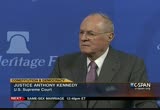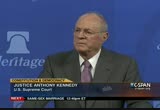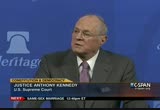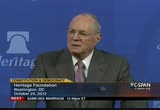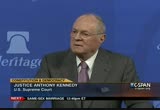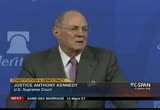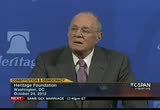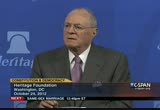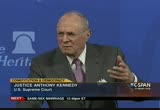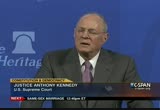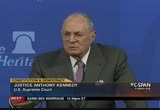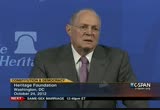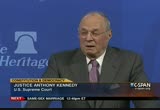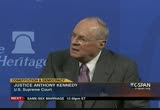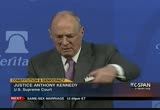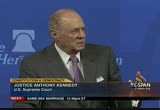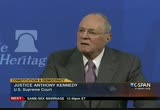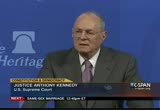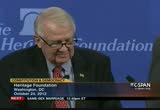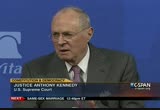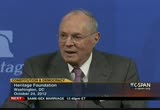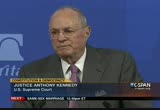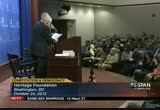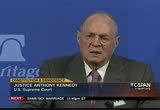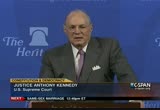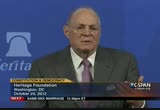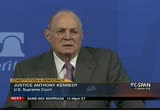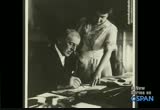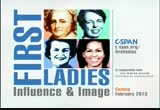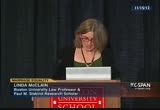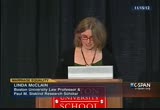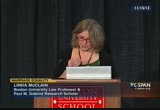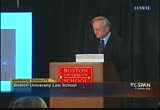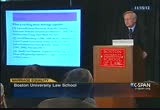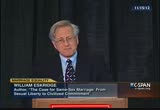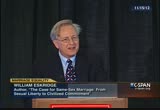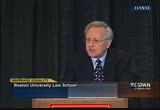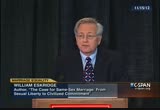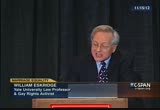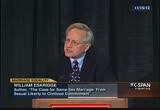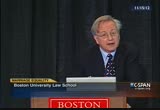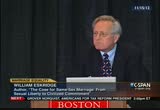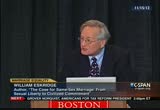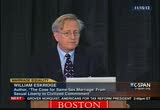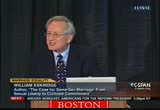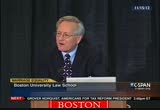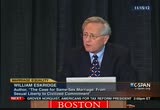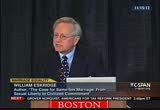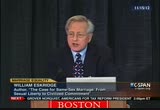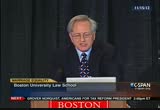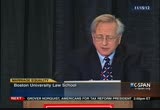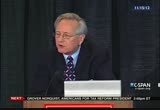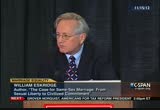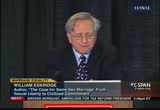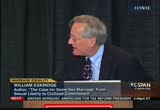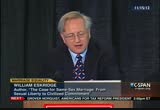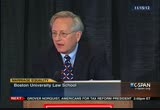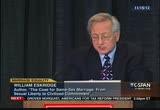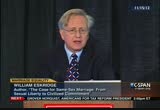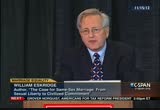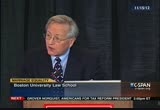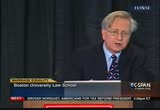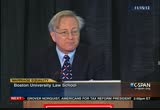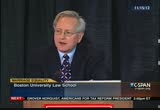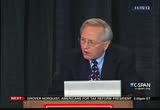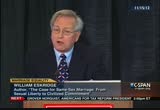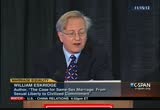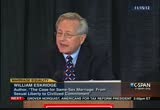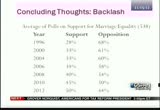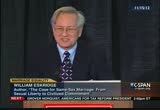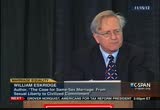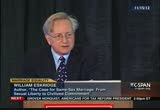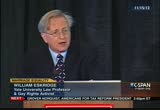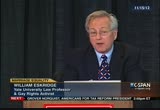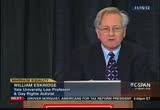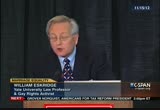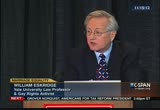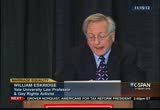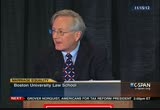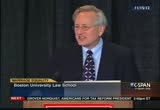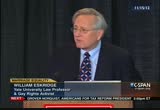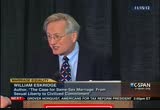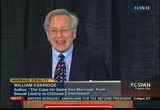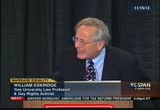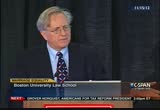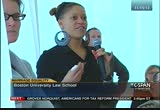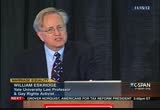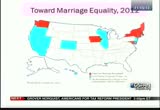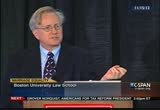tv Washington This Week CSPAN November 24, 2012 10:00am-2:00pm EST
10:00 am
former navy seal. he will be here to discuss the next steps in a federal court, federal efforts to combat the a merging several security threat. later on we will be talking with i, of the american federation of teachers. and we will wrap up with mike, he will be here to talk to us about military observers are calling for in a review of the military drone strategy in the wake of favored petraeus' departure. that is coming up tomorrow on "washington journal." you will be able to see that program live here at 7:00 a.m. eastern time.
10:01 am
>> coming up on c-span, colin powell and sam mcchrystal talk about how veterans are treated when they return from war. following that, a discussion with supreme court justice anthony kennedy. and then a look at marriage equality and voters approval of the initiatives on the balance this election year -- ballots this year. >> with soldiers on guard outside the customs house and outside the homes of crown
10:02 am
officials and with british artillery now aimed at the house, it is easy to understand why many bostonian felt threatened. soldiers tried to stir up racial tension. of course, not everyone in boston is white. within a month of their arrival, three british officers are discovered encouraging african american slaves in boston to attack their white masters. one of those drunken officers assured the black bostonians that the soldiers had come to procure their freedom. with their help, they should be able to drive the liberty boys to the devil. the british army is not in
10:03 am
boston to free the slaves. several white residents lodge complaints. captain wilson and his friends had engaged in a dangerous act to foment slave dissatisfaction. >> a discussion on how veterans are treated when returning from war. we will hear from: paul and general stanley mcchrystal, former commander of troops in -- colon powell and general stanley mcchrystal. this is about an hour-and-a- half. [applause] >> thank you for being here.
10:04 am
this is a marvelous idea. there is an appetite in america for big ideas that unite us. >> a larger idea that we should all be thinking about is how we treat our returning veterans from the two largest wars in america's history -- iraq and afghanistan. [applause] they represent less than 1% of the american population. most of them come from working- class families, from not too far from here in the working- class neighborhoods of chicago or from the barrios of the southwest or the deep woods of the south and the hills of new england or from the rural part of my native great plains. they volunteered out of a sense of patriotism and a determination to advance their own lives as well. in the course of these two long
10:05 am
wars, they have taken 100% of the risks and 100% of the wounds and 100% of the deaths. their families at home have been living in bubble of emotional trauma thinking that no one around them cares because nothing was asked of the rest of us. if we did not have someone in that war or if we did not know someone in that war, it could be out of sight, out of mind. we were not asked to make any sacrifices at home. the war just went on, fought by these brave young americans, men and women, representing the cross section of this immigrant nation in terms of where they come from. this is not just injustice. that is immoral for a democratic society to allow that. we have an opportunity to begin to correct the course -- not just welcome them home with a sign at the airport.
10:06 am
make sure that they feel that they are a part of our civilian society -- that they have an opportunity to find a job, be educated, to raise their families, and have the kind of services so many of them need to deal with their physical wounds as well as their emotional wounds. we also have to remember that many of them are coming home whole wanting to make a contribution to their society. there are not victims. they are proud of what they did and with good reason. we open this session today with two of our finest military men, two career officers who gave us all a sense of pride in that we were their fellow citizens. the first is the former chairman of the joint chiefs of staff who also served as national security adviser and as secretary of state. he is a modest man with nothing to be modest about -- general
10:07 am
10:08 am
now, you give him a standing o, and i have to deal with this. another man that come to be a very close friend -- he has been described as one of america's greatest warriors. he ran our combined forces in afghanistan and before that, he was head of the joint special operations command center at war in iraq. he is a graduate of west point military academy. he is not just a great warrior. he is a great thinker and a great leader. he is deeply involved in the issue that brings us here today. ladies and gentlemen, i am in awe of general stanley mcchrystal. [applause] thank you all very much. we hope in the course of the next half hour or so that we will be able to not just enlighten you about the needs of our society in terms of how we deal with our veterans but motivate you to get involved as well.
10:09 am
stan and general powell and i have talked about this issue before. we have familiarity about how we all feel about it. we are eager to share that with you today. what stan can do better than anyone i know is describe for you the kind of young man or woman who is enlisting in the armed forces and how their lives are shaped by that experience. it would be helpful for the people to have a clearer portrait of what happens to an 18-year-old or 19-year-old man or woman going into any of the branches and how it affects their lives early life and how it forms them, if you will. >> thanks, tom. i appreciate the chance to be here and for everyone's
10:10 am
interest. if we start at the inflection point, there is an explosion or a burst of machine gun fire or a single rifle shot and an american is wounded. that has happened for 200 years of our history, but it is an inflection point in that typically young person's life. things start to change. immediately, they provide aid to themselves. buddies come to provide aid. medics come. within an hour, so we can get them to a hospital, a helicopter come, picks that individual up and flies him off. the individual is being treated while they are on the helicopter. their buddies stay on the ground in the fight, and that fight often continues. they watch the helicopter. they get further from their buddies, but it didn't start there. it started in a small town or city or neighborhood like you know when a young person got the feeling that they ought to enter the service. sometimes it is because their
10:11 am
father, grandfather, uncle, or brother served. sometimes they lost a loved one. sometimes it was just an idea they got. sometimes they get the complete support of their community and people made a big deal about them leaving. sometimes they do it over some of the protests and concerns of friends or family. sometimes they have tried college or work and it did not work out for them. they decided that they just needed to serve and they do that. once they join the military, it is a completely different life from anything you have done. no matter what the recruiter tell you, it is never like that. [laughter] you get there and immediately the service wants to make you a service member -- a soldier, sailor, airman, marine.
10:12 am
they trust you differently. they have to learn a different language. they are trying to make you part of a team. it is no longer part of individual. it is all being part of the team. the team is one important than the individual. from the beginning of basic training and advanced training and then when they are sent to their first unit, they are always in groups. they are always in teams or squads or squadrons or flights. they are part of that. then they are assigned to a permanent force. they may be in a squad or a platoon or a battery. we stress cohesion -- being part of that -- do your part. do your share of the effort that everyone has to do so that your buddies can rely on you. the word comes that they will deploy to combat. that is even reinforced more
10:13 am
because everything about combat is about team. the saying is -- i'll never leave a fallen comrade to fall into the hand of the enemy. it is a responsibility on every soldier for every comrade. it is about devoting yourself to the team. as they come, they have done something that we as americans have asked some to do. we have asked them to believe in themselves, in each other, their comrades, and we asked them to believe in the nation. as they go forward, they are part of a team. we have asked them. they have accepted the responsibility that comes with believing. if you think from that moment this team that has become family, suddenly as the helicopter flights away, the team becomes further and further. as a fly away from the team, although they have deep feelings, it gets further at a difficult time in their lives. it is important that we as the rest of america be ready to be the team that they come back to. >> general powell, it is at least on the table in this country at the moment about what we do with returning veterans. we have the wounded warrior project. j.p. morgan chase has gotten deeply involved. i have written about and talked
10:14 am
about it. you've talked about it. it was different when you came home from vietnam. in the ensuing years for all that the military did about reinventing itself, it did not pay a lot of attention to the idea of how we make the transition from a military life to a civilian life. >> that is quite true. first, let me say how please i am quite to be here with my old friend, tom, and with general mcchrystal i did not work with general mcchrystal, but i worked for his father for years ago -- general herb mcchrystal. [laughter] i was just counting the years the other night. stan, it is scary. it is quite true. we came home from vietnam and the country did not welcome us as they had welcomed subsequent generations, especially the current generation. the most difficult part of that was that the country said that we will not have conscription anymore. you career officers -- you change this army so it becomes a volunteer army. go and find your soldiers in the labor market. go find them in the villages and towns of america. we did that. over a period of about five or six years, we created a splendid force of young men and women willing to serve their country as volunteers. they had the same tradition, the same culture, the same loyalty and dedication as any other
10:15 am
generation of americans that have ever gone before. they proved themselves in the gulf war, the panama invasion and they proved themselves in the last 10 years in iraq and in afghanistan, but the theme we have to keep in mind is something president lincoln said in his second inaugural address -- to care for those who have borne the battle. widows and children. to care. is mean to never forget that they are carrying the american spirit. they are carrying the american traditions with them. when they get injured, when they get hurt, or when they come back to be reintegrate into society, we have to be waiting to care for of them -- it is not just the federal government or the veterans administration. it is their fellow citizens who have to care for them. most of our soldiers come back from iraq and afghanistan and if they leave the solvers, all they want to do is integrate back into society. they want jobs. they want homes. they want to rebuild their family relationships or create a new family.
10:16 am
the government can help, but it is up to us. the government can always do more. we can always increase the gi bill sort of benefits. we can always do more with the respective the veterans administration. nothing is as important as companies like j.p. morgan and chase or a next-door neighbor reaching out to help a young gi as they reintegrate into their community. we owe that to them. it is our obligation because they have discharged their obligation to us. a lot has changed. what makes this period so much different than vietnam or world war ii is that these youngsters are going back and are -- especially the noncommissioned officers -- for almost 10 or 12 years depending. they come home for six months and then they are gone again. i have known soldiers and i am sure a stand has similar
10:17 am
examples of those who have been on multiple tours -- five, six tours. stan can attest to that himself. we ask so much of them. unlike some other conflicts that we have had in the past where there are moments of terrible danger and then there quiet periods, in iraq and afghanistan, there is no such thing. every morning, you could get blown apart by an i.e.d. the pressure that the young people were under was as great as any generation of warriors that america has put in the field. we have seen them come back with posttraumatic stress problems. we have seen them come back with traumatic brain injury. stan and i both know. we have been to hospitals and walter reed. we know how to save them. we know how to protect the torso, but we cannot protect the head or the limbs. the blasts affects of the iud's are blowing off limbs. i was at walter reed just about a month ago and come to a crosswalk as i was driving onto the base. a mother was pushing her son
10:18 am
across the street in a wheelchair, missing two legs. i went to the next intersection at another crosswalk and a wife was pushing her husband across the street, missing two legs. at the course of my time at walter reed, you see these terrible injuries -- the brain injuries, especially. tbi is so much worse because you can get a prosthetic limb but to recover from some of the most dramatic brain injuries may never happen. we celebrated one such young soldier at a memorial day concert two or three years ago. i felt so badly because his mother and his sister were now faced with that problem of caring for this young man for the rest of their lives and the rest of his life. we owe so much to these men and women who have served us. most of them are coming back. they will make a contribution to their companies, to their communities, to wherever they go.
10:19 am
they will be great, just like previous generations of soldiers. we also have a generation coming back that will need our help. do not wait for chase for j.p. morgan. look around your own community. look in the community next to your where you might find some of these young veterans. do they need a house? can you chip in to help build a handicap facility for a home so they can get in and out? if you see somebody who is having trouble in their life, can you reach out and say -- hey, how're you doing? come on over for dinner. a lot of these problems of stress disorder have to do with loneliness and not turning loose that war you were apart of. you can help with that. do not shy away. just do not greet them at an airport. we need you to greet them in their communities. we need you to reach other to them and their children and spouses of these families because they did so much for us.
10:20 am
we have that obligation to them. [applause] a lot of the private sector did not know how to deal with them. one of my very favorite stories was a captain who came home and the personnel office said -- i don't see any qualifications or experiences here. he said -- i don't know. on a regular basis i would lead the squad into a village in afghanistan, clean out bad guys, meet with the village elders, rebuild the sanitation system, get them power and build a medical clinic. i think it counts for something. has the private sector begin to tune in to the capabilities a lot of young people have that may not fit their idea of a harvard mba? >> i think slowly we have. i think is from both sides. military service members most
10:21 am
of whom never really has civilian jobs probably had never done a resume or job interview, not done some of the things that allow them to build up the experience and contacts that help other people. they come out a few years older from the experience. what they put on paper -- driving a tank -- may not line up with a company that says -- we do not have tanks. what do we do with this guy? it is $3 million piece of equipment with a four-man crew. it has to be maintained. it has to be operated. even at junior levels, we have this extraordinary amount of responsibility. we are starting to see this appreciation through some job fairs, some of the transition programs. there is a lot left to do -- particularly in a tough business environment where businesses are trying to make sure that they get the right kinds of skills. there is pressure on human resource departments to get the right fit. we can do more to mine the kind
10:22 am
of experiences young people bring back. the vast majority come back not just well -- they come back better. they have done things. they have matured and seasoned them. we can do more on the paperwork and connections side to mine what's really an opportunity. it is not a burden for the nation to carry. it is a mine for us to pull these resources out. >> through the gi bill which has been renewed, are they getting the kind of training that they need for the demands of the modern economy? >> it is available. we can do better with it. they are facts like completion rates for the gi bill education are not as high as they ought to be. we can structure some of those programs better so that individuals who start school have the support mechanisms to finish an associate's degree or bachelor's degree if that is
10:23 am
their goal. we can do better at that. there are well-intentioned programs that are not quite efficient or effective to this point as i hope there will be in the future. >> the university of iowa offers in-state tuition for returning veterans. i said to the president -- what is the impact on the campus? she said -- beyond my ability to describe it -- we have 200 of them here. they lifted the entire campus. as someone who went to the university of iowa -- i could have used that kind of mentoring and leadership at one point. we do not have to go do that again. paul, we talked about that. [laughter] that is value added when these young men and women come back and enter an academic or training program of some kind. >> i could not agree more. at my alma mater at the city college of new york, we had a
10:24 am
specific program at the powell center that i am happy to have named after me there and we take in gi's. we have mentoring program set for them. we have programs that get them up to speed if they have some weakness in their earlier academic career that needs correction, and we have money that is used to supplement not only their academic costs but the costs of living. more universities are doing that. it is important now because the economy is still in a weak state, slowly improving, but still weak. this affects our veterans. unlike after world war ii or after korea or vietnam, you can come back and find a job that does not require the highest skill or if in world war ii you worked in a car factory before the war, when the war was over, and they started making cars again, you could just go right back in. increasingly, our society is becoming more complex. our economy is becoming more complex. you need a higher level of school especially with respect to the information revolution.
10:25 am
i used to be a mechanic. i loved taking carburetors apart. people do not know what a carburetor is these days. you have to be skilled to handle that kind of machine and increasingly, those are the jobs that will be available for american youngsters, not stitching to pieces of cloth is together. >> are we better able to match of the requirements of military and civilian life? if you're a military-licensed truck driver, that license does not transfer to the civilian side of things. >> no, it does not. that is one of the examples of places where an individual has relevant experience that ought to really into licensing to operate in a field. maybe there should be tweaking for that state or locality requirements. we do not do that well right now. many of the skills service members come out with are not
10:26 am
leveraged like they could and should be. there are a lot of high-tech information technology skills. >> the government has latched out of this in recent months. they have gotten all of the government departments involved. what are the certification requirements to be a nurse or something like this? what can we do to take a returning veteran into a system where you get the additional skill or certification requirements met so they can get the certificate for that job? the government is mobilizing itself to do that. >> what we need to make everyone aware of is when you think of our returning veterans, you may think of the classic warrior who has been spending the last nine months on patrol with a vest and helmet and set of goggles. you have nurse practitioners, people who repair things, 18- year-old kids were keeping the electronic system of a nuclear aircraft carrier going. they are extraordinarily ahead of their age group or their
10:27 am
cohorts when they come back. >> absolutely. the thing that the military does better than anyone else is train people. it is in education factory. it gives them a wide variety of skills in the ability to produce that. to have the matriculate into experienced levels is built into the system. it can be tapped into by american industry and business. >> there are a lot of groups around the country -- the wounded warrior project. a former navy seal works a lot with greatly wounded veterans. we cannot forget them as well. they can bring something to the workplace or the community service, which we ought not to forget about that. there is young man who is a member of the minnesota state
10:28 am
senate -- lost legs. he said -- i was knucklehead before i lost both legs. in a way, it made me a better person. he went into the minnesota state senate. he became the conscious of that senate in so many ways. >> i was at a dinner a couple of years ago, and some wounded warriors were invited. i sat next to a sergeant who had lost three limbs. he was there with his lovely young wife. he was 27 years old. we talked for a little bit -- baseball talk. we got to -- tell me what happened. what will you do now? he said he was contacted by a real-estate company in san francisco. they knew about my situation. they said -- if you come out here as a trainee, we will teach to the real-estate business. we know how to teach real- estate. we will have a job for you.
10:29 am
he said -- we are moving to california. i cannot wait to start. he has been very successful. what he said to me after that almost brought me to tears. he said -- this is probably the worst thing that has ever happened to me, but it may be the best thing that has ever happened to me -- that spirit and willingness to look ahead. this is the situation i am in. i will not let it get me down. give me my pathetic limbs and arm. turn me loose. i will show you what i can do. these kids not only have technical skills, they have been trained to say -- yes, sir. they show up on time. they are disciplined. they have trained to get the job done. it starts in the beginning. we teach them right face and left face. if guy goes right, and he was supposed to go left, everybody suffers. you learn the importance of
10:30 am
teamwork. [laughter] it is also an efficient way to move a group of human beings around by marching them. they are introduced to a drill sergeant. the drill sergeant is the worst thing they could have ever imagined. he said -- i am now your mother and your daddy. forget all of the things you learned from home. you will now learn from me. they hate him immediately. after eight weeks, they do not hate him anymore. the overwhelming a motion at that point is to please him. this guy has shared all of the dangers with us. he has taught us. he has trained us. look at where we are at now. we will be honored platoon at graduation. their only a motion is to please the drill sergeant. they'll never forget his name for the rest of their lives. that type of bonding takes place. when you talk to the kids in the hospital, if they have a chance of recuperating and going back, the first thing they will
10:31 am
say is -- one to get back with my team and my buddies. they fight for a country and for a cause, but above all, the fight for each other. >> even if they cannot get back to their military unit, they will say -- i want to continue to serve in some fashion. that is a value added companies cannot build into a job description. >> in 2005, i had a noncommissioned officer wounded in action in iraq. he lost a leg just right above the knee. i was still in the fight. annie went to visit him and he said -- tell the boss -- i am coming back. she thought -- that is great, but that is not realistic. he knew i liked monty python. he said -- tell the boss it is only a flesh wound. [laughter] about a year later, this is a commando, i went on a raid of baghdad with a squadron.
10:32 am
he was back on a prosthetic doing an operation in baghdad. he is still on active duty. he is that kind of guy. there are lots of those kinds of men and women. this is a test -- when someone is wounded, it tests them. it tests inside. it tests their family. it has their young spouses, parents, and children. it tests everybody. it tests us even more. i did some numbers research. during the civil war, there were 500,000 americans wounded. with a 34 million-person population, that was one for every 68 americans. there was a wounded person in your town, probably in your family. you were comfortable. you saw people who had been wounded in war. that was familiar to you. there have been 46,000 americans wounded in iraq and
10:33 am
afghanistan. our current population, that is about one wounded for every 7,392 americans with. most of us do not see a wounded service member often. it is a test of us as a group of people. what'll we do about it? are we family? do we catch those who served for us? that is the measure of society. >> we are talking about veterans. the spouses who stay at home are also veterans. the children who are at home wondering about daddy or mommy are also veterans. they are going through their own transition. they are suffering in ways that are not immediately visible. they have served and suffered just as much if not exposed to the kind of danger as their loved one overseas.
10:34 am
as you run into these folks, and seek them out, remember that it is a whole family that has to be taken care of and not just the veteran. >> we will reserve the last 10 minutes for solutions here. it is important we have the kind of exposition we had. what do we do next as we leave here? let me give you two small examples. i have been following a young man at the beginning of the war. i tracked him during the war. he came home. he is having a hard time finding a job. he moved to northern wisconsin where his wife became a special-ed teacher. he cannot find work. we put a profile of him on the air.
10:35 am
a man by the name of mike, an internet marketer, saw the profile and realized he had been sitting at home making a lot of money while they were fighting the war. he looked him up. found his address. knock on his door, took him to lunch and said -- i have worked for you. charles said -- how much will it cost me? he said -- you have paid enough. he is now his number one provider and salesmen on the internet of used cars. there is a business in america that i did not realize existed. if you want to sell your 1996 camaro for $500, you go online, someone buys it. charles cox does the deal. he has hired three other veterans to work in his marketing company. that is one perfect example for small businesses to get proactive and go out and look for them. i have two dear friends who are both vietnam veterans. she was a nurse at walter reed. he lost a leg. he was a great hockey star at brown. they are at st. lawrence university in new york.
10:36 am
that is his hometown. they have moved back. she goes works for returning veterans. she goes up and down the neighborhood and says to the neighborhoods -- if he starts his motorcycle at midnight, do not say anything. there may be a little more beer drinking in our neighborhood. go by and say hello and find a way to connect with him. wars are won from the ground up. when they come home, we heal their wounds from the ground up as well, stan. the question is -- for someone who is out here who has a small business, where can they go to find out what is going on? the best way to do it is to go online and type in veterans who need work. you will find sites that will do that. we had something called robin hood in new york. we had a big summit meeting in
10:37 am
which people who are employers, and we put online the skill sets of a lot of veterans and try to raise the consciousness of what is going on. when business talk to you as you, what do they ask you about what they need to know? >> it is typically that question -- how do we connect with veterans and get to the population of people who may be interested geographically and skill-wise? the internet offers opportunities to do that. there are elements that help connect to resumes. many of those are done digitally. it is still not perfect. it is harder to find the body of available veterans than we would like. that is one of the areas where we can look. it is good for companies to track how many veterans they have. i am not talking about quotas. have a sense of how many veterans to have. use existing veterans and to help you network to others. you would be how surprised how
10:38 am
talent can find talent. an organization that is veteran-friendly will find talent come this way because word of mouth will spread. >> i work with a lot of companies. the ones that are doing the best jobs of this have made it part of their culture and business plan. it does not happen serendipitously. they task their managers to find veterans. they measure them against a standard of how many veterans say expect to see in the organization. you have to look for them. they cannot just walk through the door. if he went on line and threw any surge or keywords. you will find dozens of sites that can tell you how to get to touch -- in touch with veterans. how to run a job here. how to look for a skill set that to need for your organization. sometimes you will have to do more than just check a skill set out and hire someone. a lot of these youngsters one in when they were just out of high school.
10:39 am
they may pick up a lot of things in the army but they did not come in with a particular skill. you may have to have a program that built on that early education and give some the training they need for the job you have for them and not just expect them to walk to the door with everything that you need. you may have to provide training, mentoring, and other kinds of support group activities for the young people.
10:40 am
>> how do we use his experience that we are all aware of to establish a template? we will go to war again at some point. it will happen again. this kind of issue will be probably more critical at that time giving the changing nature of the economy. do we require more legislation? should it come from the private sector? should it be a combination of the two? >> it has to be a public- private partnership. the government's most important role was to make sure we have gi bill activities and funds. the government has to reach out and help communities set up systems of all of these veterans. states should get involved. city should be involved.
10:41 am
it is a public-private partnership. let us hope we do not get in another conflict that last a decades. >> stan, you have been teaching at yale. [applause] very popular. there was a time when no returning military officer could have gone on to an ivy league campus and talk a course in leadership. they are returning rotc to the campus. do you think we are healing the wounds of vietnam and that time and closing the gap between those who served in those who did not by having these kinds of discussions? >> i think we are. i walked across the green of yale and there was this line of about 300 yards of white. it was the nine navy authority students.
10:42 am
that is the start. after 40 years of not having any kind of rotc, it is a great start. we are making progress. it will take work. if the military and civilian parts of society are not forcing themselves together, you build up here. you build up mistrust. you do not know. you have to find that. it is frightening for a veteran to go to a university or to go into business. this is a veteran who may have walked into danger in iraq but it is frightening to walk into a company and try to get a job because it is a different culture. the organizations, the institutions have got to open their arms.
10:43 am
there will have to be an awful lot of veterans and some who will week bills behind them. it is different than after world war ii because the smaller population, which makes it harder. they are more of a minority. it is important we do these things to reassure them and the organizations. >> i need a point of order. [laughter] >> you can go on this time. i do not want to through do that again. >> it is not as ivy league schools. my college -- public institution that serves the inner-city section of york -- did away with rotc about 16 years after i graduated because of the vietnam war. they have decided to bring it back this year. [applause] >> i want to leave you with one story and one thought. i was in minnesota.
10:44 am
they have the military appreciation fund. they collect money for rehab, college, and other things. it unifies the entire state. the speaker was a mother of a national guardsman who had gone three times to iraq. she is a big executive at the target corporation. she did not want to be involved with her son's activities. she went off to see him often. she was named the chair of the parents left behind. look at the young mothers with their children who were crying because her daddy had gotten on the airplane. she thought she owed it to her son and her country into the sun people. she gave me the most haunting line i have never heard -- i quickly learned when you are a military mother, you go home
10:45 am
and draw the lines on the window that looked out across the driveway. you cannot bear the idea of the military arriving and a chaplain will get out. that was a template for what military families go through. the rest of us do not have that kind of fear. what we do have is not just the opportunity but the application to reach out to those families and these returning veterans. we could not have had two better representatives of the military services than general powell and general mcchrystal. thank you all very much. [applause] one of the many privileges in my life is the range of people i
10:46 am
am able to meet. early on as these wars were not winding down, i have two young men talk to me about their mission. they had served in the military services. paul rieckhoff is the founder and executive director of iraq and afghanistan war veterans of america. he did not have to go into the army. he did not have to serve in iraq, he did as a first lieutenant. he went to am worse. he served as an army first lieutenant. he was a platoon leader in iraq in 2003 and 2004. from september 7, 2001, he left his job on wall street after 911
10:47 am
happened. he went to serve. he has dedicated himself to the issues that bring us here today. he will tell you firsthand what you need to know and we all need to know about the success they have had so far and the word that is still to be done. paul. [applause] >> thank you. thank you very much. i want to start by asking you all to please give a round of applause to mr. brokaw, who has been an incredible voice for us before we were able to develop our own. he talked passionately about the greatest generation. he set the groundwork for what now we believe can be the next great generation of veterans who come home and surf. general powell and mcchrystal have an incredible voice for us. because of my unit said -- is
10:48 am
easier than being getting shot at. that is true. my story began in another big city in new york. right before 9/11. i was working at j.p. morgan at 60 wall street. i was in the new york national guard. i never thought my first mobilization would be at ground zero. i have come from a military family. my grandfather was drafted in world war two in the bronx. he served three years in the south pacific. my father was drafted in 1968 in vietnam. back then, every family was a military family. i wanted to get back. i never thought it was dark in manhattan. my story is not unique. many people have answered this call. this generation of veterans is
10:49 am
not a charity. they are an investment. it is one of the strongest investments we can make at a critical time in american history. i want to tell you a story via video about a man who grew up not far from chicago and is one of the many members of iava. >> i took the hard road. my story has been a story of success and survival. my name is nicholas. i deployed to afghanistan from january 2007 until april 2008. it is hard to come home. war can transform you. the military does not train you to come back home and be an american citizen.
10:50 am
that is where groups like the iava step in. on my right shoulder i carry my best friend's name that was killed in iraq. he transformed my life. i would not have joined if it were not for him. on the same arm i would get the iava logo. iava transformed my life since i got out of the military. i could have been a statistic. i could have committed suicide. i could still be unemployed. iava did a lot for me. >> are you sure you want this? >> yeah. >> this symbolizes everything that was great about the military and carrying it forward.
10:51 am
you do not always see it every day. you see it in the veterans of our becoming leaders in their communities, great husbands or wives, out there leading this nation and becoming the next greatest generation of veterans. >> that is nick. yes, that is a real tattoo. [applause] the tattoo shop that nick got that tattoo at was created by in iraq vet who use his g i bill money to get trained and started a small business that not the tattoos. both of their stories underscore the opportunity that exists in this dynamic, dedicated generation of young men and women. nick is one of 2.4 million men and women who served in iraq. they represent less than one- half of 1% of the overall population.
10:52 am
in world war ii it was about 12%. not everyone has someone in their household, classroom, but these people are coming home and facing challenges. not everyone comes home from war wounded. everyone does come home changed. some of them are stronger for it. they do not view themselves as victims or villains. they are a tremendous resource waiting for this country to give them opportunities to excel. 15% are women. 30% of them used the g.i. bill. over 700,000 are graduating across the country. they want to continue to serve. that is something you hear from the veterans. we want to continue to serve.
10:53 am
that is the opportunity. we have challenges. over 40,000 have been physically wounded. the unemployment rate for returning veterans is 12.1%. 12.1%. that is what we can track. in states like michigan, it is close to 20%. not everyone else comes home with stress disorder. they want to get involved. they contribute to our nation and communities. what they need more than anything else is a connection. they need an on ramp into society when they return. that is what we can do. we cannot do it alone. the va is facing serious challenges.
10:54 am
there are almost a million disability claims backlog. folks are waiting to find out if they will get care, if they would get payment, what is next. that can be a burden. these are all solvable problems. the challenge is isolated to the veteran community. these conversations are branching out. you do not have to be a veteran to support the movement. it does not matter who you voted for or how you feel about the war. we can be united and reassured that we do not repeat the mistakes of vietnam. last week there was a high- profile debate on domestic policy. the two presidential candidates that together as americans watched. there was one word you did not hear in that debate -- veteran. veterans w not considered a domestic policy priority. that has to change.
10:55 am
in order for us to galvanize the country and around this issue, you need to get involved. the va cannot do it alone. a lot of folks tend to think maybe they will be robotic. i was an infantry guy. i have the stereotype. people assume -- wall street, turn left, turn right. they do not appreciate the entrepreneurial string of that come out of these folks. they are dedicated. they do adapt, improvise, and overcome. if you really want to support the troops, hire them. they are a tremendous work force that will not only serve themselves with their communities. we have been working with different industries who understand that.
10:56 am
we were in new york city for advertising. the advertising community understood this was a tremendous resource for them to utilize. they did a job fair. we were in silicon valley where leaders are realizing this is the group they want in their workforce. when you leave, you will see incredible speakers. remember that we are not a charity. we are an investment that can lead this country to do great things through tough times. george washington said -- and we assume a soldier, do not lay aside the citizen. that is what the lead. we are not partisan. we are frustrated with the in action and what looks like slow things happening in washington. these are the types of folks that can pass through and take this country to the next level. we need your help. when you leave, take this with
10:57 am
you and think about veterans day. it is november 11. every city will have a parade and events. please step up and join. be a part of this movement. help us deliver a return from this generation. we are not a charity. we are an investment. now is the time to invest. thank you very much. [applause] >> imagine what it is like when paul comes into my office with one of his friends. i sit up at attention when he comes in. you have seen now three distinguished american male military officers who returned home on damage from this service. i want you to meet melissa
10:58 am
stockwell. she was a lieutenant in iraq in april 2004. she was hit by an i.e.d. it was on her home. in a way, her new life began on that day. she is an expert on prosthetics, having lost her leg and had it replaced by what you would not describe as an artificial leg but just a different leg. ladies and gentlemen, melissa stockwell. [applause] how did you go into the army? >> i love our country. i wanted to be in the military.
10:59 am
>> did you go in before or after 9/11? >> after. i was in rotc at the university of colorado in boulder. we were told it was more a matter of when we were deployed. it became real. >> we were making the transition at that point -- women serving downrange in combat conditions. was it difficult to be a female in a military? >> i was in a service support unit. >> i was in a service support unit. i was transportation corp. we all wear the same uniform. everybody got treated the same in the same uniform. >> let us go back to that april day in 2004.
11:00 am
it is cathartic. we ought not to be afraid to ask about these episodes. >> april 13, 2004. i was on humvee. i was behind the driver. we had no doors, no armor. 10 minutes into the right, a belasco's off. what you see today is the last day i have ever stood, two legs. there was the last of the i.e.d. >> how did they treat to in the field? >> there was a medic. they were two vehicles back. they got and iv started. they did not tell me my leg was gone. i found that out later. i was flown to a hospital.
11:01 am
i was rushed into a surgery. i woke up without my leg. >> what did you think when you realized it? >> it sounds so cheesy -- i have always been positive. i remember thinking and knowing that everything was -- it was ok. i knew i had a strong support system. i would be able to get through it. i wanted to do that. i wanted to start the healing process. >> you transferred from baghdad to germany. how long were you there? >> for about five days. i was stabilized before making the long trip back. >> you are back to walter reed. you get the prostatic. the bad news is we have too many young people losing limbs.
11:02 am
we have learned about how they can be replaced. is this the latest model? is it different from what you got from the first time? >> yes, it is the latest model. at walter reed, we get the best prospects. when i first got to walter reed, the prostatic i got was the latest and greatest. i was able to stand, walk, do pretty well early. in the american public, there are perceptions -- someone sees me walking and they say -- look at her. poor her. her life most be horrible. they think i said in a dark room and cry. but they do not know is that i wake up the next day, put on my leg, and i do more in my life than i would have done with two. my life is more fulfilled.
11:03 am
that day in 2004, it changed my life for the better. they claim that those prosthetic legs gave him an unfair advantage. that is not really the case. i can do everything i want to do, but i have to work at it. thanks to the media, you have heart breaking stories and the wonderful stories and the reality is somewhere in the middle. >> were you a good athlete? >> i have always thought of myself as athletic. >> you are a swimmer. >> yes.
11:04 am
it started out good. >> what about the people participating in the paralympics with you? >> take anyone in the games. they all have inspiring stories. each one of them has gone through an incredible obstacles and have been able to make themselves better. you know that you have overcome hard obstacles. >> having the prosthetic and having improved your life, what is it that they should know
11:05 am
about them and how they can approach them and talk about it? >> treat them like you would treat anyone else. we want to be part of reality. we want to be integrated back in life. we do not want to be treated differently. if you start talking across something i do not want to talk about, i will let you know. treat them the way you would treat anyone else. >> do you have a job? >> i do. what do you do? >> i work in prosthetics. those who were born without limbs or due to trauma or disease. >> when you talk about your work, is it a demonstration of
11:06 am
how life is much better? >> absolutely. it is kind of an unknown field unless you know somebody or you have it. when i first joined the military, my dad asked if they let girls into the military. they loved it. a lot of times it was reassuring them that life is ok and that i will be ok. we grew and thrived together. i think that they are proud. >> i think i can say on behalf of all of us that it is ok and we are glad to have you here and share your story with us. >> thank you. [applause]
11:07 am
11:08 am
michael davis. his wife was back here in the united states, taryn davis. she was stricken into solid grief, but she also knew there was a calling for her as well. their other military widows. she founded the american widow project. dedicated to providing a wide range of services and support for those who have lost their spouses. she was named one of newsweek magazine's 150 women who have shaped the world and a top 10 cnn hero. we're very pleased to have her
11:09 am
as a guest here at the chicago conference on big ideas. [applause] >> can i talk? >> yeah. as she describes her project, i want you to in some way to put yourself in her shoes. britain you got the call in the middle of the night, sometimes from a disconnected voice, and you are 21 years old. you just got the love of your life. expand the moment into the mission she is about to describe to you. the audience is yours.
11:10 am
>> on may 21, 2007, my life ended. it started out like any other day. i woke up to the ding ding of instant messaging. i ran to my computer and got to see my husband, michael, on the screen. i met him when i was a socially awkward clarinet player in the high school band. it made no sense to me that this gorgeous trombone player would talk to me, let alone to ask me out. but he did. we eventually did it all through high school and college and parted ways to until i received a call from him knowing that he decided to join the army. total surprise to me. we wrote letters every day
11:11 am
during his training. three months after we got engage. a month up to that, we got married. he was the kind of person that if you walked up to him and said he would not laugh at you. he will look at you sternly in the eyes and say to bring back a rock. he was the kind of person who made you believe in yourself. he loved "star trek" and frozen pizzas and he was my "shark week" companion. he would watch "antique road show" with me even though i am pretty sure he hated it. he was my soul mate. we talked about mundane things. we did not talk about the
11:12 am
missions that he was going on. we talked about what i ate for dinner the night before and what happened on "grey's anatomy." in this instance, we were talking about a laptop computer. after a month of deployment, you say i love you in so many ways. i typed it out. i do not know why, but i typed out, i hope you know that i love you more than life itself. i am glad that i wrote that. an hour-and-a-half later, my husband would be leading a convoy of vehicles to baghdad. there was stop over. when they stopped, they said that they were driving through up.
11:13 am
there were explosives that killed my husband and a few other soldiers. housed be a my parents' and later and getting ready to head home. my mom was asleep and my dad was out of town. when the phone rang, my little sister would pick it up and handed to me. they said, you need to come home. when i asked why, they responded that there are men that need to talk to me. who are the men? i cannot tell you. you need to come home. my heart dropped as a drop the phone. we asked a neighbor if they could drive me to my house. it was the longest 10 minutes of my life. dear lord, please let it be an injury. i stopped when returned on to my street.
11:14 am
i saw the two man wearing the same uniform that my husband wore on our wedding. i got quiet. at that point, it was like a movie scene. i got out of the car and walked to our patio. i remember seeing two men. they were shaking. michael was killed and i was the wife they were notifying. after that, it was a whirlwind of memorial service and writing the obituary. it became apparent to me that the world would keep turning. i could not die of a broken
11:15 am
heart. i like to say that with time it became easy, but months later i hit rock bottom. people disregarded my grief is due to my young age of 21. it seemed better than being in a world where people this regard my husband's sacrifice because of their political views or because of his young age at 22. i thought about michael and what he would want. it would be the ability to stand here with me today and fulfillment teams to have for each other. i had to try to live for michael until i could find a reason to live for myself. in doing that i would be embracing this title i had been given -- widow. i went to the one place where i could find answers. i went to google. [laughter]
11:16 am
i typed in "widow." i hit enter. google came back with the response i will never forget -- did you mean "window"? that was a catalyst to me. i found out that the average age of a soldier killed was 26. 56% of those serving are married. in the past 24 hours, a service member has taken the lead due to posttraumatic stress disorder. their other young men and women out there like me who are grieving and trying to grasp onto any life out there. there are individuals of or behind the statistics. i want to bring those people
11:17 am
together. that is what i wanted to start a nonprofit. i wanted to create a place where women could come together, men and women together and give the peer support that is necessary to see others like them. we have served many through the american river project. we allow them to overcome mental and emotional problems. it has been amazing. it has been an honor for me to look at them in the face and see perseverance and to see their legacies being carried on through their actions. we are taking the program is the further. as a nation, it is our duty to
11:18 am
recognize these men and women. you cannot see it, but they are there. it is our duty through our new program to allow these women to see not only can we show them the they can survive, but to thrive. given the tangible tools to pursue education and overcome obstacles. these women had given me hope. they are the reason i am standing here today. they have given me purpose. i want to give them that, too. i saw on may 21, 2007 that my life ended. i have learned through each one of their stories and their heroes that the day has not ended, but has only just begun. thank you. [applause] [cheers and applause]
11:19 am
11:20 am
we are a leader, an officer, a warrier, a wife, a mother, and a grandmother. she serves as in wisconsin, wisconsin been her home. she has served as a deputy chief of army reserve. these three women are one more demonstration of the changing face of the united states military and the changing face of our society. i honestly believe and not just because i am the father of daughters and granddaughters, the 21st century will be the century of women. general anderson. [applause]
11:21 am
>> thank you. i appreciate that a standing ovation before i said anything. i appreciate that. i also want to thank and i am very honored to be part of this discussion we are having, the conversation of a community about our transitioning service members. i am going to talk to in the next few minutes about what i know best -- what we are doing in the army reserve for our soldiers. we stayed. we also have more join us.
11:22 am
you may not realize this, but the army reserve has over 200,000 citizens soldiers. over 200,000 of them have deployed. some of them have deployed four or five times. they are still joining. they still expect to be utilized because they love this country. they have something special to offer. you may know whether someone who is in the reserve, a family member, because these individuals live in your community. we go to work every day. we work on your car. as a reserve soldier, there are working on tanks and really cool stuff. they may be your dentist. my dentist is a member of the army reserve. she joined late in life.
11:23 am
a person behind in the grocery line might be in the army reserve and you do not know it. i will talk about the programs we have for the special members of our communities. start thinking about things we can do to make these programs better and to expand their reach. as we e-book after these 11 years of war, we cannot remain static. they need to evolve. we need to support them. i will talk about our partnership program. back in 2008, the army reserve created an employer partnership office. its sole purpose was to link
11:24 am
soldiers with employers. we felt very strongly the soldiers bring something very special to the table. you may see them as an infantry soldier, but that does not explain what they have done and the responsibilities they have had and the equipment they have been responsible for. they do more than supervise people, but they are expected to mentor the soldiers that work for them. talk about professional career goals and sometimes help them out when they have family challenges. you might see a soldier, but i see someone who covers an immense amount of responsibility and touches of the people that work for them. employer partnership leverages those skills. it allows them to connect with employers that need some of those talents.
11:25 am
we all winning. they understand about being a member of a team and the importance of dedicating yourself to something that is greater than to. it is important that we all across the finish line. one of our success stories i will talk about -- a drilling company talks about why they need soldiers. he says, soldiers are good at drilling because it is hard, dirty work, and away from home. doesn't that sound like a soldier? it does. i'll talk about timothy thomas. he was one of the outstanding soldiers have benefited from this partnership.
11:26 am
timothy was laid off in 2008. he was having difficulty finding employment. he joined the army reserve in 2010. he took advantage of the employer partnership offered. you probably cannot tell, but that is antonio banderas. you probably cannot tell, huh? [laughter] it were extremely happy to have him. he was a soldier who was an asset to the company. uh, i never got to meet antonio. [laughter] a major partner in the employer partnership office is a national trucking company. they have hired 1800 veterans. they have 180 in one of their
11:27 am
programs. think about it. you have someone driving an 18 wheeler. they are driving a route in afghanistan or i ran. there is no reason they cannot come here and navigates. no way. they value the skills and work ethics that the soldiers bring to the table. that is what they are a committed partner. we're talking about noncommissioned officers who are transitioning from acts of duty. maybe they decided to go back to school. we want to repay those individuals and their talents in the army reserve. we have invested a lot in their training. i feel strongly about repaying those individuals. we want them to transition to
11:28 am
the army reserve. this program is a way to do that. find them a job in whatever community decide to move to. link them up with the army reserve unit said they can continue to support and help the army reserve remains strong. we also need to take care of our families. that is a priority in. our families make a strong. all of us together can make our nation stronger if we support them and their families. i will talk about a couple of programs we have. i will describe these programs in general. we need to evolve and change i recognize there are different needs than originally thought. we have armies from the
11:29 am
immediate centers and families. there is an 800 number you can call for assistance. the community centers it takes all. it is not a member in your member of any branch of our military service. there was a veteran who was bipolar and homeless. he needed assistance getting food and medicine. he also needed a place to stay. the center was able to help him and connected with people who could help them move forward with his life. if we talk about our families, we cannot forget some of our youngest heroes, the children. the yellow ribbon program which some of you might be familiar with is a program designed for
11:30 am
reserved soldiers to assist in pre deployment, during deployment, and when they come back after deployment. there are various programs provided for them to help with their legal issues and employment and educational benefits to be explained. we bring in everyone. we bring in this house and single soldiers and child care so they can focus completely a bigger health specialists and opportunities that are being provided in terms of counseling. we make a holistic approach to the entire family. for our children, as army children -- especially the army children -- iowa has a military installation. we need to rely on the army
11:31 am
reserve resources to support our soldiers and take care of them and address their needs. children are an integral part of that. what is provided for army kids? it is an opportunity for them to connect with appears online. there have been over 8 million sessions with army kids and this particular program. i call this a success story. we also a partner with the small business administration, the department of veteran affairs, and the department of labor to provide other opportunities. you have to be pretty of entrepreneurial when you're out there away from resources and try to make do with very little. you need to think on your feet and be created. be innovative.
11:32 am
soldiers rock. we also have an opportunity for people who may not have thought of joining. i will talk about a person named sandra. she decided to join the army at 51. of 54, so i give her a lot respect for making that decision. her son during the marine corps. the completed basic training at the same time. i looked at her in the front. her son is the man behind. who looks more tired? [laughter] she is ready to go. i want to do my part. i want to do my role. i want to add value. that is what she did.
11:33 am
she is still serving as far as i know. i think that is great. from my own personal experience, how did you get into the army? it was not a plan. it was kind of serendipitous. i went to a small catholic university in the midwest. i needed a science credit. i did not want to take anything involved in getting messy. i was working my way through college. a gentleman said, rotc. military science department. too good to be true. i'm still here. one of the best decision i ever made.
11:34 am
i do not look back and anything i did with regret. it has been an honor to serve. i will continue to serve until they tell me to go home. as i talk to you this afternoon, i want to highlight a few programs. there is this perception that we do not have programs out there that are serving our soldiers. we do, but we need your help. we need continued support for those programs. we need you to get involved and get educated. find out where we have gaps in services. come together as a community and provide the support we need for our veterans. this is our next greatest generation. there will be the next members of our state and local legislature. they will be our doctors and attorneys and engineers to help improve our infrastructure. their kids and their spouses will continue to add value.
11:35 am
we need to support them. we need to give them everything we have in terms of opportunities. one of the things we do know is that we have mental health and behavioral challenges, but you cannot be afraid. they just need to know that you care. it goes beyond, how are you doing today? you really do not want to know, but that is what you need to know. you have to get to know these soldiers. they are in your church. you run into them at the grocery store. the pump gas. they are your neighbors. just say, how are you doing? and buy them over for dinner. take care of their families when you are gone. we can do this. i know we can do it.
11:36 am
one thing i wanted to remember is the h2h.jobs. everyone needs to sign up for this. everyone needs to put the jobs that have out there and post them and hire a soldier, a sailor, a marine, hire a hero. thank you. [applause] >> i want to introduce the real commander of the mcchrsytal family. [applause] she runs the home front.
11:37 am
she was deployed for months and years on end in special forces. could not imagine what it would have been like. this is been a remarkable afternoon, i hope, for all of you. the whole idea was to the big ideas before you and carry out of here and that will help knit this country together when we feel too divided. the most important thing you can do is not just take the lessons from these remarkable speakers, but make a pledge to yourself and your friends that there is never been a more important time in american life than right now to re-enlist as citizens. thank you. [applause] [captioning performed by national captioning institute] [captions copyright national cable satellite corp. 2012]
11:38 am
>> come up next, a discussion with supreme court justice anthony kennedy. and then yale law professor talks about how president obama stance on same-sex marriage. this week on "newsmakers, "president of the service employees international union talks about what unions like the seiu are looking for in budget negotiations. can see "newsmakers" at 10:00 a.m. >> what about if the soviet union announces tomorrow but if
11:39 am
we attack cuba, it is going to be nuclear war? >> serious things here, we're .oing to be uneasy p >> something may make these people should off. -- shoot it off. i would want to make my own people very alert. >> it is a fascinating moment. it is amazing that eisenhower tells him to have a people alert. of course people are alert. kennedy laps. then he says, -- laughs. then he says, hang on tight. they're able to joke a little bit with each other. especially during this crisis, the had a sense of how lonely it is to occupy that office and i
11:40 am
were getting all kinds of a device, good advice, a lot of faulty advice, which kennedy was. eisenhower knew all about faulty military advice. he is able to speak with supreme authority about the dangers as well as the advantages of military advice. he was a very useful ally -- a useful ally to kennedy. >> sunday night at 8:00 on c- span's q &a. >> supreme court justice anthony kennedy talks about every american's duty to protect and preserve the u.s. constitution. from the heritage foundation center for legal and judicial studies. this is about an hour. [applause] gentlemen. it is great for me to be able to to this lecture. this is the fifth annual
11:41 am
occasion on which we have had this lecture. the heritage foundation vision is to build an america where freedom, opportunity, prosperity, and civil society flourished. to help achieve this vision, the center launched the preserve the constitution series, which is an annual lecture series to inform citizens on topics related to this constitution. the series promotes the protection of individual liberties, property rights, free enterprise, constitutional limits on government. we've been able to feature some of the nation's most respected judges, legal scholars, lawyers, and policy analysts. the marquee event is tonight's program. the namesake of tonight's lecturer became the youngest associate justice ever to serve
11:42 am
on united states supreme court when he was appointed by president madison in 1812. he made a significant mark on american law in his 33 years on the bench, but his greatest contribution is is renowned commentaries on the constitution. justice story a famously and correctly declared "a constitutional government is addressed to the common sense of the people and never was designed for trials of logical skills or visionary speculation." this lecture series celebrates his legacy in the law. prior lectures have been judge robert bork, professor john harrison, judge raymond randolph, and chief justice of the united states court of
11:43 am
appeals of the sixth circuit. tonight, we're honored to add a fifth name to that prestigious list as a welcome justice anthony kennedy. justice kennedy received his bachelor of arts degree from stanford university and the london school of economics and his law degree from harvard law school. prior to this public service, the justice served in private practice in san francisco and sacramento. i can attest to his prowess as an attorney because on one very interesting occasion, he represented me. [laughter] on a speeding ticket. [laughter] and got me off with a minimum fine. [laughter] from 1965 until 1988, justice kennedy was a professor of constitutional law at the
11:44 am
university of the pacific located in sacramento. he provided valuable support to gov. ronald reagan on a number of legal issues as a volunteer lawyer. he was appointed to the united states court of appeals in 1975 we served for more than 12 years until president reagan nominated him as an associate justice of the u.s. supreme court. he took his current seat in 1988. president reagan remarked that his career as a judge in the u.s. court of appeals for the ninth circuit, as a constitutional law professor and a private practice was marked by devotion to the simple straightforward and enduring principle that we are a government of laws and not of men. justice kennedy has played an integral role in the consideration and decision of
11:45 am
some of the most significant cases and the most serious constitutional challenges in our nation's history. he has been a staunch defender of first amendment rights, individual liberty against government intrusion and federalism. these are core themes of our preserve the constitution series. we're honored to have the justice your heritage to provide this evening's lecturer. please join me in welcoming the honorable anthony kennedy. [applause] >> thank you very much. good afternoon. my fellow citizens in the nation that must see ever closer to the idea and reality of the rule of law.
11:46 am
it is a special privilege and pleasure to be introduced by my long time and valued friend. ed came to sacramento in the late 1960's. at that time, there was still in the state government a continuing tradition that public service was a high calling. public service was an honor and a trust and a duty. in my early years in sacramento, i had the good fortune to meet leaders of the state of california, the heads of executive departments. they appreciated the fact that civil service is a public trust. the whole idea of democracy is
11:47 am
that each generation is the trustee for the next. each generation has the obligation to ensure that democracy is stronger for the next generation that is for our own. each generation has the duty to conserve and to preserve and to transmit the assets of a democracy. theties' do not grab all assets for themselves. ed meese was squarely within the tradition. he considered public service to be a great honor. it is again my pleasure to be with you this afternoon because you were the ideal of a dedicated public servant. your work continues here at heritage for which i congratulate you.
11:48 am
the heritage of freedom is fragile and it must be transmitted from one generation to the next. that is the purpose of the heritage foundation, a remarkable institution which exemplifies one of the strong voices of a pluralistic and principled society can produce. the heritage of our freedom is closely tied to the constitution of the united states. the heritage of liberty is bound up with the constitution of the united states. some of you may be thinking, it is pretty good. here we are. americans talk about the constitution and there is a
11:49 am
reason for that. the constitution gives us our identity. the constitution gives us our self-authentication, self- esteem, defines our purpose, it defines our mission, it defines who we are as a people. we come from many ethnicities, nationalities, religions and yet we are bound together as one people because of our allegiance and our respect and our reverence for the constitution. this is the link, the bond to history and to our heritage. it is unique or almost unique in the world.
11:50 am
this tie that we have to our competition that defines us, it gives us stability and the purpose and mission to our people and it is the envy of the rest of the world. the british revere their constitution as well. not quite the same. william gladstone, prime minister of england, one time compared the american and english constitution. he began by saying the english constitution was grown, the american constitution was something that was made. if you ended there, it sounds like something that was patronizing.
11:51 am
he went on to refer to the american constitution in the most laudatory and complementary of terms. he said in that same statement, just as the british constitution is the most subtle organism ever to proceed from the womb of a long gestation of history, so is the american constitution, the single most wonderful work ever struck off at a given time from the purpose of man. this was a highly complementary statement. it is hard to find superlatives for the work the framers did in philadelphia in 1787. there is a book, which i have
11:52 am
mixed ideas about to because it is filled with conversations that never could have happened -- [laughter] but the title is "miracle at philadelphia." and that is not wrong. washington, of course, was the presiding officer of the convention. the american constitution was by accident and design. the delegates -- the first month, would there be a president, would be a council, would the president have an absolute veto? at the end of the month, none of these things for resolved. at some points, at the delegates would say, the 18th century equivalent of we are out of fear.
11:53 am
washington would say, gentlemen, please stay. you did not walk out on the general. and stay for three months and finish the document. one of the great if's in history is what if jefferson had been at philadelphia? it is interesting that two of america's greatest thinkers john adams and thomas jefferson were not at philadelphia. adams was the american minister to the court of st. james. jefferson the american minister to paris. jefferson made a tremendous contribution. he sent to his friend madison over 200 books on political
11:54 am
thought, political history. my surmise is that some of those books must have been about the dutch federation. jefferson was not there. he did get his hands on a copy very quickly of the constitution. we e-mailed a copy for him over in paris. he said, where is the bill of rights? the answer was, there is no bill of rights. every people on earth is
11:55 am
entitled by nature to a bill of rights which protect them against their government. this foreshadowed a problem. george mason was one of the members of the virginia delegation. he had written the declaration of the rights for the state of virginia in 1776. it was a few months before jefferson wrote the declaration of independence. when the convention was over, mason, who was a member of the virginia delegation, was a
11:56 am
member of the virginia delegation, would not sign the constitution. washington was infuriated. so came about one of the great informal agreements in american legal history. there was an agreement that if the constitution ratified as written by 1787 convention, there would be a bill of rights. so we had a bill of rights in 1791. we have a hamiltonian structure and a jeffersonian bill of rights.
11:57 am
one of the principal structures is separation of powers and checks and balances. we use those terms often interchangeably. they have a different crest. separation of powers teaches that each branch of the government has a certain autonomy to act on its own. checks and balances works the other way around. it indicates the government cannot operate unless the branches interact with each other. there is a certain newtonian metaphor to checks and balances. the framers of the constitution
11:58 am
and their fellow countrymen were sons of the enlightenment. it was not just jefferson. many of the framers were fascinated with all sorts of gear is in balance wheels and clocks and pendulums and machines and they could see this newtonian metaphor with checks and balances. two components of the congress must act in concert. congress enacts, the president vetoes. congress overrides, the courts review. like a pendulum or a clock. this metaphor captivated the american mind.
11:59 am
12:00 pm
this idea that if the apple fell out of a tree, there was a lot of nature, a universal principle, the human mind of its own force could discover was liberating. this idea swept the world. do you know who became the successor to the mantle of newton? this was not a celebrity-crazed era. checks and balances works the other way around. it indicates the government cannot operate unless the branches interact with each other. there is a certain newtonian metaphor to checks and balances. the framers of the constitution and their fellow countrymen were sons of the enlightenment. it was not just jefferson. many of the framers were fascinated with all sorts of gear is in balance wheels and clocks and pendulums and machines and they could see this
12:01 pm
newtonian metaphor with checks and balances. two components of the congress must act in concert. congress enacts, the president vetoes. congress overrides, the courts review. like a pendulum or a clock. this metaphor captivated the american mind. the framers are not only good inventors, there were astute learners of human behavior. the enlightment was so powerful, newton was the poster boy. this idea that if the apple fell out of a tree, there was a lot of nature, a universal principle, the human mind of its own force could discover was liberating. this idea swept the world. do you know who became the successor to the mantle of newton? this was not a celebrity-crazed era. but washington became the most admired person in the world. there is a connection. he was the poster boy for the american revolution. there is a relation between the two. the framers demonstrated that the human mind of its own power can discover and right laws of a decent government. this is the force that separation of powers and checks and balances had in the original constitution. you do have constitutional law courses on structural mechanisms and the constitution. this is just a drive-by discussion. i should mention of federalism as one of the other great structures. i once gave a lecture to some patent attorneys and they are a difficult audience.
12:02 pm
[laughter] you're trying to get their attention. they are busy with quadratic equations. i asked them if the framers had applied for -- this is metaphorical, not technical, of course. maybe difficult with them with checks and balances. it was a brilliant implementation. in fact, if you look at article one and look at article 2, the style is completely different. article one sets out with great precision. what are the powers of the
12:03 pm
president? the sentences are longer, the style is different, in the middle of the sentence, you have to pick out the executive power, foreign ministers. there is a reason for that. the framers were not sure what the executive would look like, but they were confident it would be washington and they trusted him to establish the tradition. i do not think checks and balances were a breakthrough in the prior state.
12:04 pm
you could see the reflection of its in england. military, power of the monarch, emerging independent judiciary. i thought, a brilliant implementation. federalism is a unique contribution. the framers had the idea that you have more freedom if you have two governments instead of one. you almost get intellectual whiplash. why more freedom if you have two governments? many students think of
12:05 pm
federalism as being a brilliant administrative device. this was the biggest land mass since the roman empire to attempt a unified government. it took six weeks to get from new england to south carolina. if you are a business person or a manager, you have territorial division. in the 1960's, and the 1970's, when european and scholars were looking at american federalism to see if they could find some lessons for the european union, many of them thought of the american federal system as being a device of administrative convenience. but that is not the whole theory of federalism. the theory of federalism, the
12:06 pm
genius of federalism is that it is wrong as an ethical matter, wrong as a moral matter for you to delegate so much power over your own life to a remote central authority if you can no longer plan your own destiny and the destiny of your children. that is the moral and ethical underpinning of federalism. those are structural components, hamiltonian structure. there might be tension between the two, but there is a stunning synergy.
12:07 pm
structural components of the federal constitution work quite well with the bill of rights. the bill of rights, you can have a full constitutional law course on the bill of rights. this idea of structure and substance is the pedantic device. the first amendment, you cannot have a government work unless you have free speech. it is structural in that sense, but it is also a substantive right. it is inherent in the human personality and dignity that you have the right of free expression and free worship. in thinking about the first amendment speech clause -- it is hard for me to think without a blackboard. even if it does not work because there are at least
12:08 pm
three different realms for speech protection. if i drew circles, it would look like a target. you would inevitably have to assign a more central feature to one type of speech than another and i do not think anyone type of speech holds a priority over any of the others. if you could think of a venn graph, it shows the circles that move. the overlap each other, but they are transparent and the circle keeps its 360 degree of integrity.
12:09 pm
sometimes one is on top of the other. if you think of that, you can think of the least three components of free speech. the first is political speech. this is essential. it is essential to the american democracy. there are many people that think -- and rightly so -- that there other things in the world more important than politics. art, culture, religion, science, philosophy, sports. whether the umpire got it right last week, this is all part of the speech and thought and belief that is protected by the first amendment. and there is a third dimension. speech is what allows you to define your persona, your personality. your speech, your thoughts, your beliefs are who you are.
12:10 pm
12:11 pm
we had a case recently protecting speech videos, i never looked at these things. women in spiked heels killing. we protected speech on the day of the funeral of the serviceman killed in the middle east. there were protesters using derogatory words about gays, saying that the military would be doomed to perdition because
12:12 pm
it protects gays. at first glance, you might think that the court and its first amendment jurisprudence has adopted, embraced the philosophy of relativism. moral relativism. all ideas are equal. who are we to say that one idea is better than the other? if we were going to have a philosophical argument, you could make a very strong case, all speech, all art is equally good. you would find a strong argument against that. relativism leads to skepticism. skepticism leads to cynicism.
12:13 pm
cynicism is corrosive. it is a philosophic decision of the first order to embrace the philosophy of relativism. how do you explain the supreme court cases? it is very simple. the supreme court is not for the government to decide. the government does not take a position on which philosophy is correct and incorrect. this is for the people. it does not mean that people
12:14 pm
cannot and should not and must not debate ideas to determine what is good and what is bad and what is right and what is wrong and what is virtuous and what is evil. those of us who have taught in law school know that law professors use skepticism, but that is just a method. it is not an end philosophy. it is an order for you to think. those of us who have taught that in the number of our young people are reluctant to embrace some ideas as good and some ideas as bad. but please do not think that this is endorsed by the supreme court.
12:15 pm
it is a choice that society makes. i've been talking about the constitution. you have a capital c. that is the document the framers hammered out with washington in 1787. it was ratified in 1789. the formal document that lawyers argue and judges interpret. that is the big c constitution. constitution with a small c is a word that has been used for centuries. it means the sum total of
12:16 pm
customs and traditions and morays and beliefs and historical heritage that define a people. it was used by aristotle. the whole point of official free speech is the people can define their small c constitution so their country has a meaning and purpose and a history and destiny. it is the small c constitution that other people look to, other countries look to come to see what the united states is,
12:17 pm
what it stands for. if you have moral relativism as the public philosophy, you have a problem with teaching the importance of our heritage. you have a problem because teachers are reluctant to say that one american hero was good and virtuous. everything is the same. the result is that young people are discouraged when finding magnificent examples in our history.
12:18 pm
if you say something important, that is an ethical judgment. that puts us at risk. it is not just public servants that have the duty to preserve and protect and defend the constitution of the united states. all citizens have that duty. this requires conscientious, conscious effort. you do not believe in freedom because you take a dna test. freedom is taught and teaching is a conscious act.
12:19 pm
all of us have the duty to preserve and protect and defend the constitution. but you cannot preserve what you do not comprehend. you cannot protect what you cannot transmit. you cannot defend what you do not know. the small c constitution, the heritage house and so many other distinguished groups in american society contribute to, must understand it. we live in the age of -- let me make two more points.
12:20 pm
let me tell you two stories about poland. we were in poland eight years ago in september. i was going to visit the supreme courts in poland. when you go to european countries, you have to go to three courts often. you go to three dinners and you bring three gifts. [laughter] i have agreed to meet with the faculty in warsaw. they arrange for me to meet with the faculty. and we did.
12:21 pm
midway through the meeting, there were some notes being passed and they said, we did not realize are answering law students are here for an orientation day and they would like for you to talk with them. law in europe is undergraduate. very few countries have a graduate law school system. the students were basically high-school seniors ready to enter their freshman year of college. i talked with them. it was a room smaller than this. we started talking and a student raised her hand and she said,
12:22 pm
checks and balances are very important in your constitution. the president checks the congress. who checks the courts? we talked about that. i'm not sure i had a satisfactory answer. [laughter] another student raised his hand and said federalism is very important in america. money goes to washington and then goes to the states with conditions. doesn't this undermine federalism? a student raise their hand and said, chief justice marshall was very much admired. they said, it took you until 1787 to get your constitution. we have been studying in your constitutional history since the
12:23 pm
fourth grade. if i did that class at american university i would've said, that is a great class. i told the same story that night in front of the president of the university. if you wanted to be a doctor or a scientist or an architect or a lawyer, you could not do it. you went into the schools for 50 years. we had the best teachers in the world. in the united states, i get visits often from high school groups.
12:24 pm
friends of our family will bring their teenagers. i am often quite impressed with their grasp of american history. but there are some real problems generally. we were in a place this summer where people had gotten together grants for exceptional high school students to go to europe. they come back and give a report. this one student had gone to auschwitz. why is auschwitz important? because that is where "schindler's list" was filmed.
12:25 pm
there must be substance. this time compression that we have is aided by the fact that we have new media. this is a subject for a whole lecture. we have the internet and this conversation that we have in our small c constitution. must strive to become more decent, more rational, more thoughtful. there was never a golden age of political debates. it is always some much raucous and we cannot expect the political world and the public discourse to be in the confines of a court case or a legal argument. we must pay more attention to
12:26 pm
making principled -- there are tremendous changes. we had a case in which the question was whether or not cable-tv must carry rules for broadcasters. the technology is going so fast, we are reluctant to freeze into the constitution first amendment principles based on technical mechanisms. the emergence of the internet and twitter and other innovations shows the wisdom of that. we're going very fast. it is important that we use this new power, this new potency we have to have a civic discourse
12:27 pm
in a small c constitution. that is respected by the rest of the world. make no mistake, the verdict is out on democracy. they're looking to the small c constitution to see how democracy works. i will close by suggesting one concept that is of some help. the supreme court is invited to go to the state of the union address. we go as a matter of etiquette. there is a beautiful credenza, which is the desk for the clerk of the house of representatives. it is a five sided credenza with five different planes and a
12:28 pm
single plane across the front. it says, equality, justice, liberty, freedom. what is the word in the middle? it is tolerance. you have to be careful. i do not know who made up of these words. equal justice under law, supreme court, that was made up by the architect. [laughter] i am not sure about the prominence of tolerance. it is an important word. the framers did not use it very often. speculation on my part, i will check it with some scholars. i think, in part, it is because the toleration acts had a lot
12:29 pm
of baggage. they did not want to bring in the baggage. it was not a word used very often. it was a word which found its force and its legitimacy and power and necessity -- tolerance is the essence of humanity because all men are activated by folly and vice. be careful of the relativism calculus. tolerance does not mean that i
12:30 pm
accept your views as right. our european friends seem to be going in a different direction. they want the government to enforce speech laws. we have not chosen that direction because we think the power of speech and the power of a small c constitution, which is a decent and respectful, can shame people who are intolerant there are some close calls. can you tolerate intolerance? we can discuss that. it does not mean that you tolerate evil. hitler was evil, maniacal, insane. those are evil acts. we think of speech, the calculus is different. it is a strong society which must immerge and remain strong
12:31 pm
in order to make our speech the envy of the rest of the world so that freedom can can advance. that is the purpose of heritage and for the work of heritage, and for inviting me here, please accept my thanks. [applause] >> the justice has agreed to take a few questions. we have had a few questions submitted by members of the audience.
12:32 pm
let me ask you first -- this is a rather practical question, you've spent thousands of hours reading articles and transcripts and writing and rewriting opinions. what has contributed most to your decision making during your time on the supreme court? is it the quality of the briefs, discussions with your colleagues, or the oral arguments? >> some of the esteemed attorneys who appear before us, i've been reading briefs for over 35 years and i've yet to find one i cannot put down in the middle. [laughter] when i was circuit justice for the 11th circuit, i went to meet with the attorneys and the judges and as a courtesy, we met on saturday morning and they
12:33 pm
were dressed casually. do you have any questions? and somebody said, how do you read all of those briefs? i said, i assign cases to my clerks. if it is difficult, i bring it home over the weekend. i will read it a second time with the opera. the audience was too polite to roll their eyes. it came across as hifalutin. i thought i lost the audience. a fellow raised his hand and said, i have a rule when i write those briefs. i have a one 6-pack brief and day 2 6-pack brief. and i said, i remember your last one. [laughter]
12:34 pm
the briefs are very well written. they're tremendously important to help us understand the consequences of our decisions. when i first came on the court, i thought it was an antiquarian exercise. it is surely forward-looking because you are bound by what you do. the oral argument, sometimes we do not behave well. a good oral argument is like a discussion of a doctoral thesis. it is during helpful. it is really -- it is very
12:35 pm
helpful. it is all of the above. discussions with colleagues, they are mostly in writing. it is a good process. >> the next question. i think you've already answered it. what makes for a persuasive brief? >> it shows the consequences of the decision. there are of tremendous importance. >> what has been the most difficult case you have decided?
12:36 pm
[laughter] >> the one i am working on now. [laughter] >> when warren burger was chief justice, the court decided far more cases per term. the court now decides about half that number. is there a particular reason for a reduced caseload in recent years? >> we are not sure. when i came to the court, the first year we had over 150. by april, it was a nightmare. you could barely read the things. 150 was far too many. 70, 80 is not the optimal capacity, but we wait until we find cases where the federal statute is declared
12:37 pm
unconstitutional or the circuits are in disagreement. many of our cases come from the acts of congress. the bankruptcy reform act almost a decade ago produced a number of cases. there have been many major congressional enactments and those produced the cases. we wonder about this. we take cases because we think our guidance is necessary. when i went back to our hometown of sacramento, i had to go back into the courthouse to get a document. as i was going up the steps, my heart started to beat. when i was arguing the case, i would get really nervous. i get very nervous when i go into the conference room with my colleagues. i then have to argue for the cases. i want to make sure i do not miss. i appreciate what the advocates have to go through. they can be tremendously helpful.
12:38 pm
12:39 pm
designed for another justice. if we behave well and the council can have an exchange and can enter the conversation the court is having with itself, it can be a wonderful dynamic. we're very fortunate that we have a dedicated, experienced bar. that is necessary for us to understand the consequences of our work. and to write an opinion that not only is understood by the parties, but gains the allegiance of the american
12:40 pm
people. thank you. >> justice kennedy, we appreciate you being our lecturer. we would like to present a small memento of the occasion. we hope this will remind you of your service to the heritage foundation. thank you very much. [applause] [captioning performed by national captioning institute] [captions copyright national cable satellite corp. 2012]
12:41 pm
>> a discussion on marriage equality. falling by grover norquist, talking about the so-called fiscal cliff. later, a look at u.s./china relations as china elects new leaders in its 18th national congress. >> join us tonight for the evolution of facebook. he is an engineer who advise the ceo and talks about the developments on the social media side like time line in his feet. watson added 8:00 p.m. eastern here on system. with a change in our happen anymore.
12:42 pm
>> we will align ourselves with those that are bringing about this suffering. >> the white house is a pulpit. you ought to take advantage of it. >> this is nothing short of a public health crisis. >> he told me when someone have their own agenda. >> he just got ashamed. >> i think they serve as a window on the path to what is going on with american women. >> she becomes the chief confidante. she's the only one in the world the contrast. >> many of the women who were first lady were writers, journalists. >> they are more interesting as human beings than their husbands. if only because they are not
12:43 pm
first and foremost defined and limited by political ambition. >> dolly was both socially adept and politically savvy. >> dolly madison loved every minute of it. mrs. monroe absolutely hated it. >> you cannot rule without including what women want and what women have to contribute. >> there's too much looking down. i think it was a little too fast. the need a change in paes. >> yes, man. >> they never should have married. >> she later wrote that she said i never made any decisions. i only decided what was important and when to present it to my husband. the stop and think about how much power that is.
12:44 pm
that is a lot. >> part of the battle is to fight the fear that accompanies the disease. >> she transformed the way we look at these rules and made possible for countless people to survive and to flourish as a result. i do not know how many presidents realistically have that kind of impact of the way we live our lives. >> is walking around the white house grounds i'm constantly reminded about all of the people who live there before and artillery all of the women. >> a new series on c-span, produced in cooperation by the white house historical association, coming in february 2013.
12:45 pm
>> a discussion now on marriage equality with william eskridge, a yale law professor. voters approved to legalize same-sex marriage in maryland, maine, minnesota, and washington stake in the last election. this is about an hour and 20 minutes. >> good afternoon. i am linda mclean. it is my honor and pleasure on behalf of the dean of the boston university school of law and on behalf of the back of the workshop committee to welcome all of you to the law school's annual distinguished lecture and to introduce a professor etherege jr., a professor of jurisprudence at yale law
12:46 pm
school. the annual distinguished lecture is a highlight of our academic year. we are fortunate not only to have a preeminent legal scholar addressed as but also to have him addressed us on a topic that could not be more timely. in the publicity for this lecture, the title was the long road temerity quality, 2012 and beyond. the revised title, beyond backlash. the time and as of this topic explains why c-span is taking this picture and will broadcast it to a live audience. if you have not already, turn off all pagers, cell phones, and mobile the voices before we began -- devices before weakened. another note, during the q and a portion of this event, please stand and wait until a volunteer hands you a microphone.
12:47 pm
professor at the rich has had the task of updating his power point slide after his door outcomes on november 6 in maryland, maine and washington were voters approved a ballot initiatives in favor of allowing same-sex couples to marry and voters in minnesota rejected a constitutional amendment that would enshrine the ban on same- sex marriage in its state constitution. we are excited about this opportunity to put these recent developments in a historical perspective. as you will see from the publicity about this lecture, prof. eskridge could easily adjust us about legislation, he is also an architect in his field of law and sexual orientation. today he is addressing a topic to which he has devoted
12:48 pm
enormous effort -- merit equality. his analysis has influence litigators, judges, lawmakers, as well as scholars and law students. i will briefly mention three features of this work that had been broadly implied jill and from which i personally benefit in my own work. he honor the history of same-sex unions taking on the claim that same-sex marriage is simply unheard of and his work on the history of the struggle for same-sex marriage in this country took on the claim that for the most part, the gay rights movement was not interested in marriage. he has advanced norm to argument in favor of same-sex marriage. as compared to work on the state -- on the treatment of same-sex couples have shaped the
12:49 pm
debate. he wrote about the america in scandinavia into conkling's by conservatives that when countries legalize marriage, a casket of disasters be false the institution of marriage and family. his compared a work also introduced to american audiences the theory of small changes which is that country to deplete follow a pattern along the pathway to full equality and liberty for gay men and lesbians. this has provided a hopeful context of the civil unions obverses marriage issues. without further ado, it is my great pleasure to introduce you to our distinguished lecturer, william eskridge junior. [applause] >> i appreciate the invitation
12:50 pm
and that wonderful introduction by professor mclean his own work -- book is coming out next week which will address some of the issues i will talk about today. my first slide, there is nothing new about marriages. the same 60 multiple pattern on his own sister and her longtime companion. we've come a long ways since the janes brothers and sisters. this is one of the most exciting areas of public law today. the law review will publish this and i will advance some new arguments in this lecture. this is one of the most dramatic of our public law and constitutional issues.
12:51 pm
it is more dramatic even then watching television. which television show you are watching the pence on where you are coming from -- depends on where you are coming from. i think this is an analog modern family. i think same-sex marriage is delightful. i think it has a future. in contrast, however, rosenberg
12:52 pm
has argued that same-sex marriage is not much like modern family as it is like revenge. i can see there are not many tv watchers in this audience. revenge is a show that is not about happy families. it is about sick families and the revenge that happens when things are stirred up. same sex marriage litigation has led not on the whole to advances for lesbians and gay couples but instead to revenge. and backlash.
12:53 pm
now there is a third story that might be told and i don't think that is presented in this lecture, another story by the many sincere traditionalists, a lot of religiously motivated to think that same-sex marriage is not like modern family, is not like revenge, but instead like homeland. at the very famous series about a trojan horse former prisoner of war that was burrowing into the american body politic and will ultimately destroy america. those are the three television stories. let me start at the beginning of the litigation because there were not falls led marriage litigation's. i wanted to talk beginning at the stonewall riots in new york in 1969. it represented the first time in recent history that lesbian and gay people literally fought back against the longstanding police oppression. there were several evenings of
12:54 pm
riots. they galvanized literally tens of thousands of lesbians and gay men to come out of their closets or they had been residing in to announce themselves. this was the first time that large numbers of bisexuals at transgendered people had come out and responded publicly. as people that were committed to one another in a longstanding union, sometimes they were even raising children together. some of them had the asperity to argue that not only are we openly gay or lesbian and committed same-sex partner that i raise children with, but i also think that we have the right of the state to recognize our unions as civil marriages the same as different sex
12:55 pm
couples. interestingly enough, at the very point with a fair number of same-sex couples started thinking this way, there was a landmark supreme court decision, it handed it down in 1967 and struck down the remaining laws in the south that barred marriage is by different race couples. it is race discrimination and suspect as a classification. we're going to strike it down because there is no compelling justification. they also ruled that discrimination by the state violated couple -- many in the 1970's all way through today
12:56 pm
have taken that language and subsequent decisions to assert that lesbian and gay couples have a fundamental right to marriage. subsequently, in the debate in the united states, banning effectively sex discrimination, this will lead immediately to same-sex marriage based upon an analogy. because the opponents suggested that, i think, quite logically, that if you have a woman and woman with a licence, it denies this because her partner is not a man, it is literally
12:57 pm
discrimination because of the sex of the partner. some people argued in the early 1970's that it should be required by either the federal or the state era's. like other groups, and women themselves, they began to see themselves as a minority or cohesive minority that should not be treated unfairly. and for whom discrimination based upon sexual orientation was just as irrational a point of view as race and sex discrimination. it might surprise you to know that serious constitutional
12:58 pm
lawsuits with the aclu was 40 years ago, baker vs. state. they brought the lawsuit that rejected an effort to ban gay marriage by a constitutional amendment. when it got to the supreme court, baker and mcconnell got at least one of the supreme court justices literally turned his back on their argument. he turned his chair around as the aclu was making the argument for marriage equality. not a simple justice to ask a question, they wrote a short opinion denying the right and the lawyer took it to the supreme court which dismissed the appeal for lack of federal question. they were very successful as the baker lawsuit was.
12:59 pm
we will see why they were uniformly unsuccessful during that time. arguments for gay marriage seemed off the wall. marriage is a matter of -- it was strongly associated with procreative unions between one woman and one man. there is also the widespread perception even among liberals that gay people were intrinsically anti family. they were non-procreative did you get to a 1980's and there was even further antimony against lesbian and gay claims
1:00 pm
for quality. and the fear of aids in the trojan horses like gay men bearing the aids virus created a climate of overwhelming hostility. that is the main reason, and i think the supreme court would not have been receptive to these claims. the nixon and reagan supreme court were a very conservative collection of justices, most of the justices themselves harbored anti-gay prejudices and almost all of the justices were reluctant and some utterly unwilling to expand the president to protect other minorities.
1:01 pm
and the laws that made it a crime, usually a felony, to have consentual sodomy with an adult partner in a private space. there was a political conundrum that how could you recognize gay marriage if the underlying consummating sexual conduct is a felony in your jurisdiction? and that is a logical as well as cultural conundrum. this is 1999, in fact. the state of union throughout the twentieth century. i don't know if you want to write down some of those studies, but there is the math. the 1990's is a major turning point.
1:02 pm
there were many other terms in that decade. i was actually the attorney in the first case after denmark in 1989 recognized same-sex registered partners. it specifically motivated some of these earlier litigants. my clients at the district of columbia included one lawyer that was [indiscernible] they read about the danish statute and said, why can't we do this in the united states? they got yelled at, took it to their legislators, a distinguished catholic institution, they got themselves
1:03 pm
1:04 pm
in the '80s, you are the bearer of a dreaded disease that america hates and they hate you as well, to move from being despised and anti-american minority to a barely tolerable one is the best news in your life. that is what happened in the early '90s. and further courts revived a strong interests in the state constitutionalism to protect the rights of minorities but the voter was not willing to do it. the supreme court decision
1:05 pm
upholding consentual sodomy laws in the state of georgia where you could receive 20 years in prison for sodomy for consensual activity, but in the 1990's, one state supreme court after another in some unlikely places like georgia and arkansas and tennessee strike down the sodomy laws under their state constitution. it culminates in texas in 2003. within this climate, it seemed like the time was right. the other case we lost two-one, and in retrospect, it was a blessing for the movement. in the ones they we did when the litigation, the hawaii supreme court in 1993
1:06 pm
tentatively made a feint in the direction of marriage equality by ruling that lesbian and gay couples -- they remanded for trial to see if the government could meet the burden. in 1993, there is a tremendous backlash against the supreme court ruling that same-sex marriage might be on the horizon in that state located thousands of miles away. even continuing until today it will not recognize same-sex marriages because it might infects the body politic with this disease.
1:07 pm
even hawaii, the voters voted 60%. the national republican party in 1996 seized upon this as a possible wedge issue. to take away catholic at southern baptist voters from the democrats. they were proposed to ratify the recognition laws and also to permanently codify into the federal statute books the proposition that the 1100
1:08 pm
federal regulations that pertain to marriage will never pertain to same-sex couples. president clinton did not resist the statute and joined in and support of the statute. leaving you with a spectacle in 1996 of speaker gingrich of the house, majority leader dole of the senate and president clinton of the united states, the leaders of their respective parties, the latter two candidates for president and the three highest ranking adulterer's in the united states sponsoring an effort to protect marriage against lesbian couples, raising children in committed relationships. only in america.
1:09 pm
the '90s was not a big era for a advanced in many respects. it also inspired other lawsuits. i think a big breakthrough was in the neighboring state of vermont where the grass roots movement persuaded the vermont supreme court to strike down the exclusion of gays and lesbians from all of the benefits and rights of marriage, but they left it to the legislature to provide remedies.
1:10 pm
in many ways, i think it was a brilliant move because in 2000, in a bipartisan effort, dominated more by democrats established a civil unions law survived the inevitable political backlash in the 2000 election. a statute which expanded the couple's everyone of the legal duties of marriage. also quite important in california into and -- 2003. they recognize the parliamentary statute followed a very important leader. and a very intelligent political campaign, they nearly
1:11 pm
ruled that marriage exclusion of same-sex couples violates the state constitution. they give the legislature several months to implement this, reaffirmed in 2004 when they met the mandate. in may of 2004, for the first time in the united states, officials started handing out marriage licenses and nullified in previous campaigns.
1:12 pm
they argued there was a backlash against the decision in massachusetts. does backlash was much less pronounced. in the state of massachusetts, the persistent campaign to amend the constitution was rebuffed at every turn by the legislature. president george w. bush's campaign with the federal marriage amendments did not get through this said. , the cloture vote and the supporters of the federal marriage amendment could not even secure a majority. to be sure that there is a proliferation of states and a crucial amendments mostly by initiative, even sometimes civil union claims in 2004 to
1:13 pm
2008. nonetheless, we start to get color in the map that i gave you before. recognizing full marriage equality and substantial equality in vermont and california and a modicum of equality in a way that had their reciprocal beneficiaries law. it is the big breakthrough. the marriage ecology movement -- the quality movement picked up after that break through. it has been a normative movement in each state and has shown the following progression that each state has moved at a different pace. they had the to confront the
1:14 pm
idea that gay people were outlaws. most of the states had already repeal of these laws and nullified them by 2003. the more important innovation during the time we are talking about is the adoption and anti- discrimination laws. a number of other states have followed massachusetts in some form, prohibiting discrimination based on sexual orientation. most of the state laws also prohibit discrimination, many of them also with other venues. the famous supreme court decision that struck down an effort by colorado voters initiative to sweep away and permanently prohibit these type of anti-discrimination rules at the state or even municipal level. many religions including the
1:15 pm
roman catholic side aggressively and actively denounced discrimination based on sexual orientation. finally, there has been a rise in many jurisdictions of the day is good idea. a significant number of the populace believed that not only is gay not malignant or worthy of being outlawed, it is actually five and a good and i don't mind if my daughter mary is one. in this jurisdiction we have seen the biggest audiences where gay marriage is recognized, and the religions have celebrated lesbian and gay unions. and as we have seen with race, it changes in social attitudes in a direction towards even acceptance.
1:16 pm
at the same time massachusetts is acting in this very important way, our neighbor to the north is going through exactly the same kind of cycle of litigation, push back, and a tentative case legislation as well. the landmark decision in 99 prohibits family based discrimination in terms of rights. that prevents the marriage equality lawsuits at the provincial level and decisions supporting marriage equality, and shortly after they adopt marriage equality statute, this guy did not fall on canada and it has survived under conservative government as well as liberal government. we have seen marriage equality in spain, south africa, scandinavia.
1:17 pm
most countries and the rest of the world. in europe, if you don't have marriage equality, you are likely to have registered partnerships. here is the list of situations in the united states. the map as suggested has been updated to take account of last tuesday. i have not had to on color anything based on results and you see the pattern. it is very significant, a lot like europe. except new england has us playing the role of scandinavia and even kind of similar. together,, close we're very cultured, it is
1:18 pm
splendid when and adopting same- sex marriage. the only holdout is rhode island that has civil unions and i am sure they will rectify that very soon. i wrote in 2006, we laid out here is the data base upon legal changes. the states that would adopt marriage recognition in the next 10 years, another color was battleground states and the other color was home states that would not. they are exactly the states, the color maps are exactly what we thought. it has been very predictable. the third group of states i described are not going to adopt marriage equality any time soon and will have battleground states like pennsylvania, ohio, that is the kind of state you would expect.
1:19 pm
that is where we are today, and it is a long road. and obviously, most of the country is not colored in, so there is a long way to go. this is certainly my point of view, he probably believed it is now inevitable that there is no turning back on marriage equality for the very simple reason that the lesbian and gay couples that have gotten married or who want to get married, many of them raising children are actually good couples. they are fine. they want to be married for the same reason that the straight couples do and want to have children for the same reason. those families operate the same. and it is actually good for america. it is not a big deal, it is a
1:20 pm
good deal. young people realize this and old people who do not are dying. that is the long-term prognosis. this is why you see one of the witnesses, the only two for supporters of proposition 8, one of the witnesses has already recanted. you ask him why. he said it just seems inevitable to be doubted if it does not seem to me to be a great calamity. i think that is a widening perspective. and also a widening perspective that this is the great civil- rights cause of your generation and is something to be on the right side of and not on the side that looks like george wallace.
1:21 pm
it is still a very intense issue, and there are people that disagree with one another on this issue. we are still going to see state popular initiatives. most states have constitutional amendment barring same-sex marriage, those would have to be revoked either by a new voter initiative or by some kind of federal constitutional litigation. obviously, california is the primary example of that. california in 2008, i talk about this at greater length in my article. it requires marriage equality in the state of california as something like 18,000 marriage licenses were issued. between july of 2008 and
1:22 pm
november 2008, the latter date when proposition 8 was voted in by the people of the state of california to amend the constitution to override the court. the court interpreted as not qualified for the marriage licenses that have already been given out. there would be two ways of responding to proposition 8 aside from acquiescence which is not a possibility. the more logical one would be to go back to the voters after a more educational campaign, the kind that they just had in the state of maine and responded fairly warmly to. in my opinion, we had a lost opportunity in 2008 in california. based upon expert opinion, the campaign against was mainly run in glittering generalities.
1:23 pm
i think it is a very poorly idea to run a political campaign. suggest that there are a lesbian and gay couples, hear their voices about why it wants -- why they want to get married. what it means to their children, here is what it means to their neighbors, their ministers, the rabbis, the priests, some of whom do not support same-sex marriage, but support these couples that are serious couples seeking recognition of their serious relationships that are long-term and raising children. that is the wish to have run it in 2008, i think that is the way they read it in maine in 2012, we would have won such an initiative in 2012 in the state of california. astute watcher of the election
1:24 pm
results, there was no initiative on the california ballot along these lines ha. the reason was a federal lawsuit which was brought in the wake of proposition 8 to challenge the discrimination as a violation of the people's protection laws. that suit is before the u.s. supreme court which is considering whether or not to grant review. if they don't grant review which is more likely, they will have the ninth circuit do some more thinking. at some point, i think we will have same-sex marriage in california. it would have been a simpler and more legitimate process if we had done it through some kind of voter initiative. at the same time, we are now seeing the federalization of litigation on marriage equality. the parallel federal constitutional litigation, remember that?
1:25 pm
president clinton, senator dole, speaker gingrich. so there had been a number of challenges to doma and it is imploding. there are dozens of bankruptcy judge's ruling that it is unconstitutional as applied to the statutes that they are implementing. the attorney general says we are not going to defend the constitutionality anymore, though the administration is still enforcing it. there have been decisions now, our circuit, charcoal and of graduates. i believe two of the three panel members struck down the defense of marriage act and i think the first would be a very
1:26 pm
solid foundation for a supreme court ruling. it will issue some kind of result next june. the final question is the pairing question, the proposition a question. does the u.s. constitution requires states to recognize same-sex marriages? mclean suggested and i argued in 1996 that the constitution as a matter of principle does prohibit such discrimination. the question is not as the constitution prohibit it? i think that is the right answer and i believe that is the answer people will have to reach as a society at some point. the real question is, do we want the u.s. supreme court to reach that result in 2013 by
1:27 pm
taking review and ruling as broadly as judge walker ruled, or do we want the supreme court to rule more narrowly? or perhaps the best result is for the supreme court to deny the review and send it back to have the ninth circuit reaffirm its and have same-sex marriage licenses start issuing in california again. this is an issue whose outcome is inevitable, but it is not inevitable that the answer will be delivered in 2013. the final portion of my talk and i will wind up, the major focus of the law review article. it also might be one of these things that is more certain.
1:28 pm
the long road i have just described, what i tried to do in the article, a theoretical basis for what political scientists have been calling a backlash. with about same-sex marriage or the equality debate in the united states, there are two different kinds of debates we have the engaged in. one is a policy debate, is there a need for it? would it cost money? serious thoughts should be done on that debate. the other debate that is going on in tandem is what i would call a small constitutional debate. it is constitutional and be very literal sense, not just of the society, but of people's identities. and so long as it has been for
1:29 pm
most of my life, as the debate involves intense identity politics on both sides, one thing we should not delude ourselves about is that lesbian and gay people consider this policy on our side and it is also identity politics on the other side. it is not an example of big hits that have to deny people their rights. the typical opponent of marriage equality is a matter of her own identity as a religious person, a member of the family, a member of the community believe that it does not behoove her community and her politics to depart from the traditional definition of marriage. if you are liberal, you find that hard to swallow.
1:30 pm
many of you in this room do not favor the death penalty. you're not just opposed to it, you're opposed to being part of society that has a death penalty even though you will not be subjected to it, at least most of you. and the reason you oppose it is not a policy reason, although i am sure you could give me policy arguments. the reason you oppose it is constitutional reasons. you don't care about the eighth amendment, you care about not being part of a policy that puts people to death especially if it is racially biased like it has been in this country. that is why they are on to something. this is an issue that has divided the country intently, very evenly even today.
1:31 pm
the way i see it, there is an evolution of what has been called the politics of backlash. for most of what i am talking about, minnesota baker to vermont baker, the politics of backlash has overwhelmingly dominated normal politics. marriage equality for years was simply ignored, and when it's brought to the public agenda and was actually in the front page of the new york times, it triggered a local and national backlash. traditional family values people were alarmed and that the gop was able to use it as a very effective issue but not effectively enough given the unscrupulous this of the sitting president. backlash dominated, and any effort to disturb the status quo was going to provoke an
1:32 pm
overwhelming response. the second half begins in earnest with the vermont civil unions debate which is saturated with backlash and also saturated with people that thoughtfully did consider the policy issues about the backlash issues. i think we have seen that in this state, with the marriage people in california, and the litigation through new york that recognizes marriages quality. people's identities have been affronted. the backlash is very much less that it was and the issue is now balanced, i think, between a backlash of politics. taken from a silver on what the numbers look like, these are not members of backlash
1:33 pm
politics. early on, there is very little support for marriage equality. the numbers have steadily gone up, and the variable is good rich. it triggered a short-term response that was positive and negative, but i think the consequences, i believe since 2004, have been more than 10,000 marriage licenses handed out in the state of massachusetts. there is ballet choreography of the quality that we have not seen in the united states before. a year as the title of what i want to publish. it very much illustrated this year that we are moving beyond backlash. this is the what i usually
1:34 pm
thank, and not just those lawyers, she is great nonetheless. we should also extend a vote of thanks from new york and president obama and even his vice president for coming out of the closet as an openly straight politician who is in favor of marriage equality. and we saw the results in the 2012 election. this did not cause president obama the election, it probably helped him. he had a healthy margin of victory of the popular vote. his margin was larger than his larger -- that his margin of victory. there are lots of groups you could say it about, but is also true of lesbian and gay voters.
1:35 pm
the issue almost certainly helped president obama and did not hurt president obama. the lesson is not lost on the republican party. here are my concluding thoughts. it is a complicated history to were the long road of marriage equality, the beginning is a complicated answer about backlash and the popular analysis of what is going on politically. what i want to conclude with, this has been neglected by the backlash theorists, how the courts have advanced marriage equality. i think there have been three things about what the courts have done.
1:36 pm
from my point of view, the most important is a fantastically important setting for capabilities. the word marriage in our vocabulary only meant different sects. after they linguistically, the notion of same-sex marriage entered our vocabulary and is now no longer in quote marks. courts are capable of reversing the burden of political inertia as well as giving publicity to an issue and putting it on the public agenda. and in massachusetts, the first state to recognize marriage equality even though it was for a fraction of the people in the
1:37 pm
country, these are the laboratories of experimentation. and the point of why massachusetts is so important in this country is that this has created conditions for falsifying not only the policy argument such as the bill clinton argument that he needs to defend a marriage as a vulnerable institution against gay and lesbian partners with children, but it also falsifies the prejudices and the deepest prejudice against gay people in this country in my lifetime is the stereotype that gay people are anti family. they are selfish, their sexuality is sterile, the sexuality itself as intrinsically anti family. one of the things has been to
1:38 pm
1:39 pm
there is a fabulous article by a political scientist that documents of the pro-gay agenda flourished during the same time we are seeing massive backlash. indeed, it was synergistic. i will use my home jurisdiction of the district of columbia to provide the example. d.c. reformed its consentual sex laws to make among many other things, consentual sodomy legal in 1981. the democratic controlled house of representatives overrode the district of columbia to reimpose penalties on sodomy. when the district in the early 90s created domestic partnership, congress was controlled by the democrats. congress is all consumed about protecting marriage against gays and lesbians. by the middle of its, the district of columbia in the mid- 90s reform to the sex crime laws and decriminalized sodomy. not a peep out of the republican controlled congress.
1:40 pm
it went into effect in 1994 and 1995, republicans resumed full control of congress. but even the most anti-base senators in american history introduced a proposal to override the district sodomy law review. there is a reason for that. i talked to religious leaders. it was the religions and other groups felt that the marriage issue was their wedding issue, but they didn't want to appear to be uniformly and overwhelmingly anti-gay. a very distinguished catholic theologian said in 1994, yes, the catholic church properly believes that sodomy is a terrible fate, but it doesn't mean that it should be a crime and we should really focus on other issues like marriage.
1:41 pm
that is exactly the way it worked out. there were lots of briefs, not one of your usual suspects and it reads for almost three dozen religious groups. not a peep out of the church of jesus christ of latter-day saints. they acquiesced and ultimately a constitutional right to engage in consensual sodomy. i maintain that not only did marriage equality helped deliver the gay rights agenda, it altered the agenda of the counter movement in ways that i think were very productive.
1:42 pm
this is a minor thing, courts can and do marginalized of lyre perspective that raises the stakes of politics. the u.s. supreme court, a conservative court supported -- appointed by reagan was a 6-3 vote that the citizens of colorado cannot disparage a lesbian or gay people and take away descriptions -- protections from them. it was a pervasive influence on anti-gay campaigns and rhetoric. it does not prevent anti-pay policies from being implemented, but i believe it has lowered the stakes of the campaign against gay-rights. i think the supreme court has done something and intentionally productive this year, the supreme court recognizes the the the first
1:43 pm
amendment a ministerial exemption to anti-discrimination laws. this is not a favorite of liberal commentators, but with that opinion does is it sends a very strong message to the opponents of marriage a quality that even when marriage quality goes to court, when it goes to the legislature, there is always an exemption for religious organizations. it means marriage equality will not intrench upon the inner sanctums of the sacred domain of the opponents. and what they said is that even without legislation, the courts are going to prevent political correctness from affecting the structure and hiring policies of religious organizations. how broad that is, we don't know.
1:44 pm
i think this is one of the ways, it does not lower the states of the identity politics on the other side and provide some reassurance to religious minorities. that is all i have to say except that you should read the boston university law review and you should serve on the first circuit where you can write and joined landmark decisions. [applause] >> thank you for a fabulously substantive lecture with an awful lot to absorb and ponder, built promised i could ask the first question. and so i want to ask you, you
1:45 pm
published in the case for same- sex marriage in 1996. those things are kind of intertwined with each other in these petitions making their way through the court concerning the doma law. the first circuit provide a solid foundation for supreme court ruling invalidating section three. the bipartisan legal advisory group, it was really just three republicans, they argued that it is not a legal standard that anyone had heard of before. they have called at a novel and made up standard. the second circuit based on intermediate scrutiny, the court has before it a couple of
1:46 pm
different choices. the second circuit says no federal appellate court has given a persuasive reason for not moving to heighten scrutiny. the petitions are coming before the court very soon for a conference and i am curious about what you think the court will do. will they read it as this in between standard that is more intensive but not up to intermediate? it seems unlikely, but will they say that they will move to heighten scrutiny? >> let me say three things in response to the question. when you are at intermediate appellate court, your options are limited. it is presumptuous of you to say, ok, sexual orientation is now a fixed scrutiny classification and this is something we think the supreme
1:47 pm
court will do. the second circuit case, it is a move that the supreme court will make when it is good and ready. but your second question is, where will they be voting? and not the obvious answer but the answer i am going to give you is that it will parallel levin. aside from the great title, it is a great opinion. the supreme court, the cohabitation case right before, they never felt that race was a subject classification requiring scrutiny. it never laid out the document framework. so i think the level of scrutiny is endogenous to the
1:48 pm
substantive issue. i don't think a star of saying that in the abstract, what should the level of scrutiny be? let's apply the test. i don't think they do that. what in the hell are we going to do with this case? what do we wanted to lower courts about what they need to do next. that suggests, this is my third point, that if the supreme court is ready today to sweep away all discriminations on the basis against lesbian and gay couples and people, that all of the 50 state laws that discriminate in terms of marriage or anything else, it will face scrutiny if they are prepared to do that. for one thing, i don't know that there are ways to say that.
1:49 pm
and ruth later ginsberg, she thinks that roe vs. wade was a mistake. in the sweeping way they wrote it. she would have gone down narrow opinions. i don't know that you have proved better ginsberg saying sexual orientation is now strict scrutiny, and it will sweep away all marriage discrimination. i don't think they will do that in the doma case, to use a term of art called fudging. needjargon, but you don't a ph.d. to understand what it is. it is not exactly clear what is
1:50 pm
valid or invalid. and this is a smart thing for you to do if you are a court and the issue is still an incendiary identity politics issue. you want to fall somewhere, i think the chief justice is not what this either. that is a pretty broad spectrum. it is broad enough spectrum. neither wants where the supreme court issues a disrespectful opinion that is going to be undermined and it will look like plessy and ferguson.
1:51 pm
they don't want that. it's not smart for them as individuals or for the court. it looks like the supreme court is simply ending discussion on an issue before the country is settled on an issue. i think in connecticut, we are. i think nbc, we are. a lot of the country is mississippi and not massachusetts. the points that i make in the article, there is the point that john kerry may have lost the presidential election in 2004 because of the marriage issue. that is nonsense. john kerry may have lost for any number of reasons. including massachusetts.
1:52 pm
there has only been one time in american history that ohio has voted for a mass.-based presidential candidate. you actually make a better case that john kerry lost in ohio because of massachusetts. asked governor romney. same problem. even ohio. for the country, it is not quite settled on this issue. it would be smart for the court -- it's dumb or doma. the title of an article. doma is a profoundly stupid statute and it creates lots of dysfunctions and problems and headaches just to administer.
1:53 pm
it was passed in an hysterical fit. those are not constitutional arguments. the problem for justice ginsburg and justice kennedy is take that intuition and then somehow [unintelligible] it. rohmer can be read for almost anything or nothing, depending on what you want to do with it. that is what i think the boston university opinion is such a good one. it is highly respectful of all the stuff the supreme court is interested in. it shrouds itself in all these great supreme court decisions.
1:54 pm
the mayor going to strike it down because we think -- the best thing that has ever been written by supreme court justice is justice thurgood marshall's opinion in the rodriguez. 1973 or thereabout, the school funding case. marshall knew more about the clause than anybody else in the 20th century. what he said it the way we do the klaus -- the clause is more a balanced thing. how important is the right to the people being excluded?
1:55 pm
how important is it to the government to exploit them? and how big a change in the policy would it be to strike down the exclusion and can courts do this? it is a fine balance. several more questions. >> thank you for that. i have a question about your percentages. to what extent do you think your percentage its, but gradual increase in support for marriage equality is based on a perception that gay people can be good straight people? they can get married and have a dog and kids and a white picket fence? to what extent are you uncomfortable with that? there's a certain domestication
1:56 pm
of people required in that argument. i was wondering if you were uncomfortable with that. >> that is a brilliant question. the answer is yes and yes. a lot of that is the normalization of lesbian and gay couples. am i comfortable with it? the answer is also yes but i have to give you a because on that one. one of the criticisms which i think is quite valid is of wonderful people that the same set marriage movement has de- radicalized whatever radical and critical attention might have remained america.
1:57 pm
it is attracted people who are much like other americans and therefore leaves of the people behind. i think that is the criticism. it has holes in it. among them being that the beneficiaries of marriage equality, no one has been able to document that it is just people who are like other americans. a lot of working-class gays, the couple's joint in a student union or marriage are disproportionately, racially heterogeneous for gays and lesbians for more working class people who are transgendered even. here's the other thing. let me go back to the maps. if your agenda is to make family lot more pluralistic,
1:58 pm
the marriage equality litigation has been a godsend to you. how was that? it has created experimentation that goes beyond marriage. when i was growing up, family law consisted of one thing -- marriage. if you had sex summer not merit --and were not eric, you were a criminal. but the 1980's, it was more heterogeneous. you could get married and also got it. the law started to regulate that. today in your generation, you now have even greater header -- can grow to 80. at the corporate and municipal
1:59 pm
level. you have civil unions lost, domestic partnership laws. then you have wisconsin as colorado. taketate's, let me colorado as a good example. colorado pass beneficiaries- sheets which has several dozen off the rack rights irresponsibility is if you become a beneficiary of one another. it is a different kind of support system. the fidelity requirement is easy to enter, easy to get out the. these are experimentations in these are experimentations in new forms of regulation. i wrote a book on what is being done in europe. what i call it called the practice. that is what marriage equality has done. it is the result the three ct
114 Views
IN COLLECTIONS
CSPAN Television Archive
Television Archive  Television Archive News Search Service
Television Archive News Search Service 
Uploaded by TV Archive on

 Live Music Archive
Live Music Archive Librivox Free Audio
Librivox Free Audio Metropolitan Museum
Metropolitan Museum Cleveland Museum of Art
Cleveland Museum of Art Internet Arcade
Internet Arcade Console Living Room
Console Living Room Books to Borrow
Books to Borrow Open Library
Open Library TV News
TV News Understanding 9/11
Understanding 9/11

